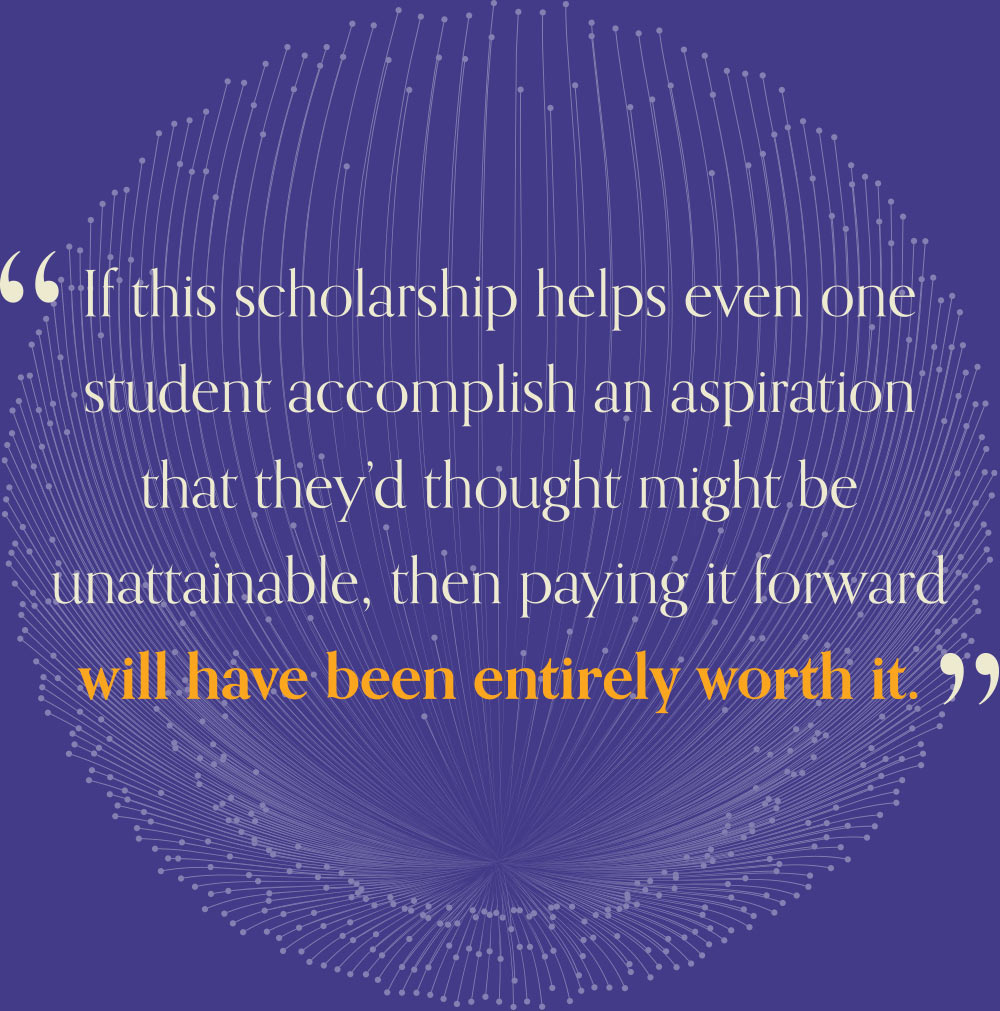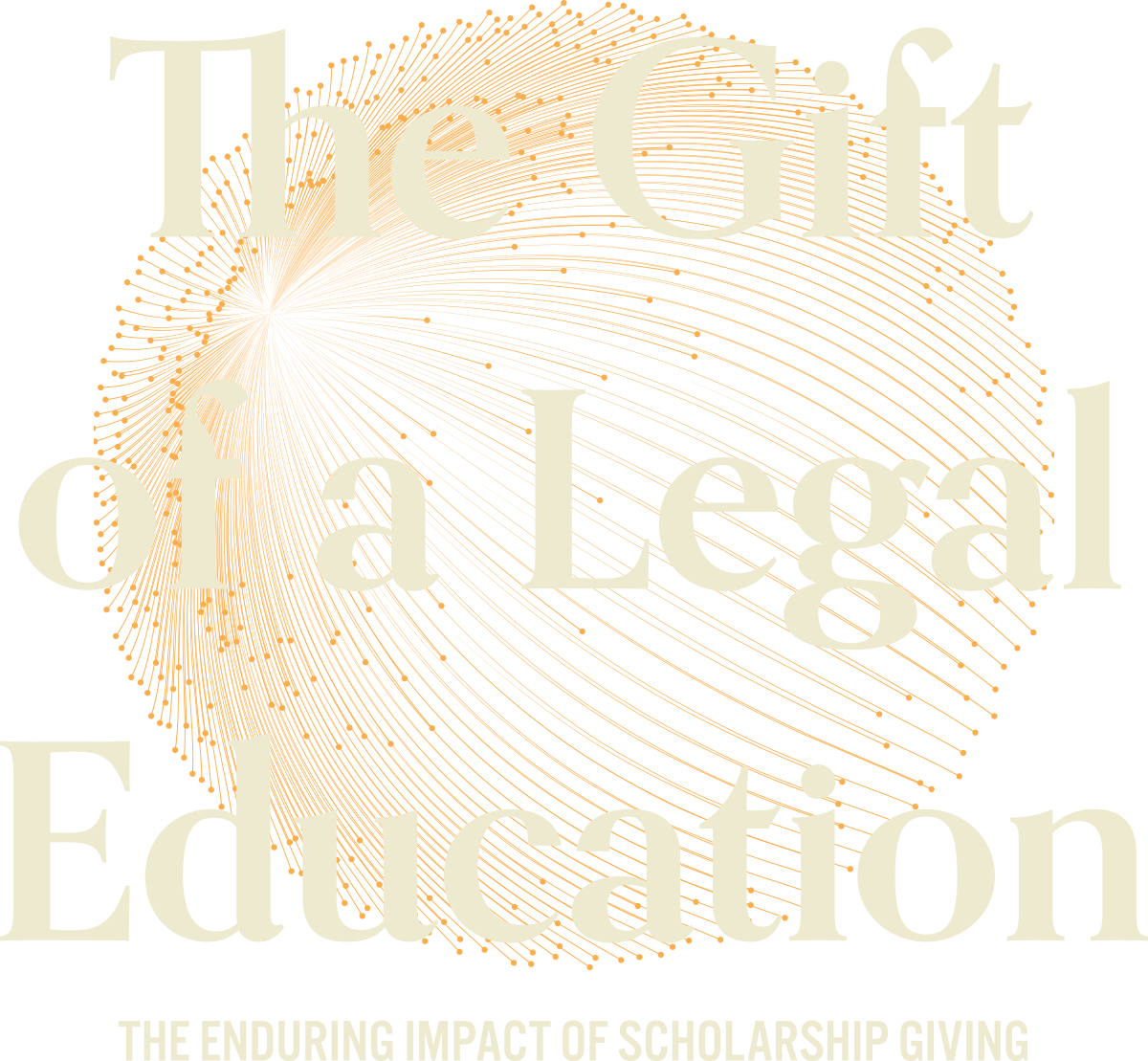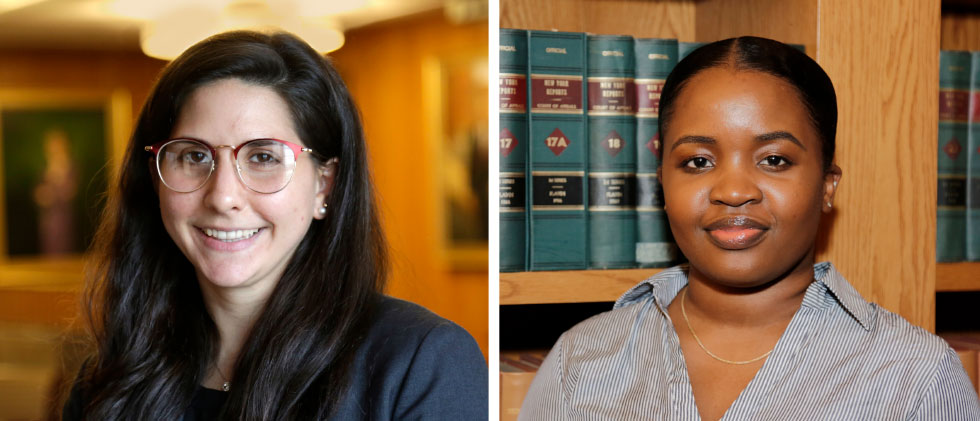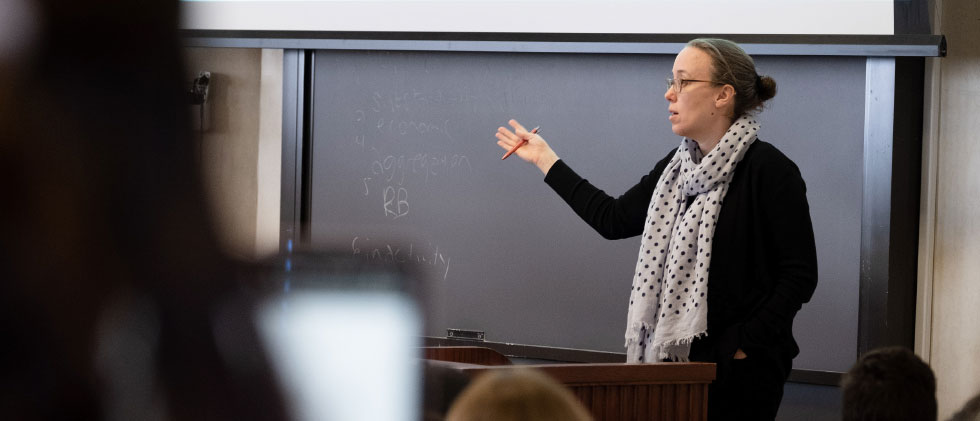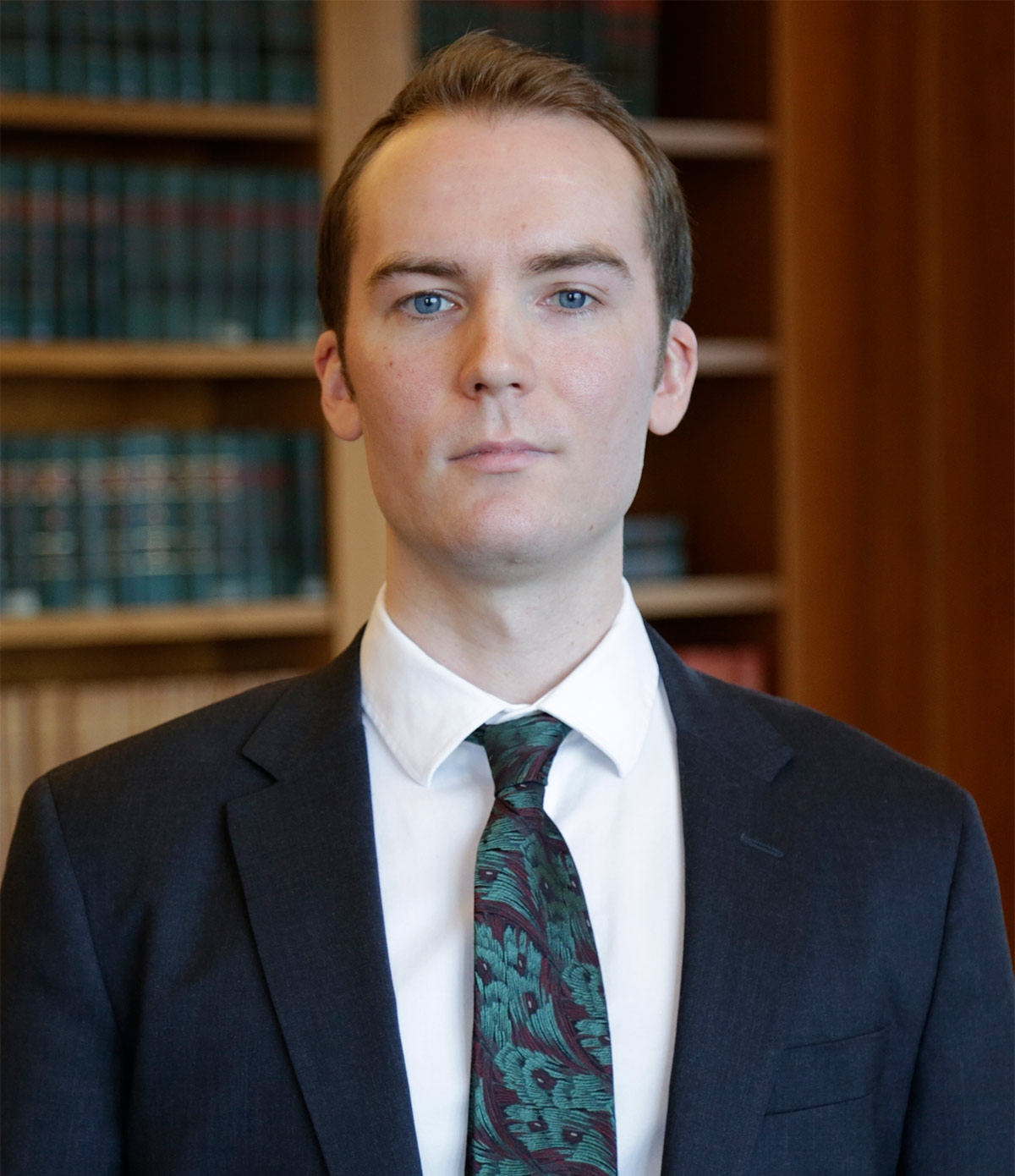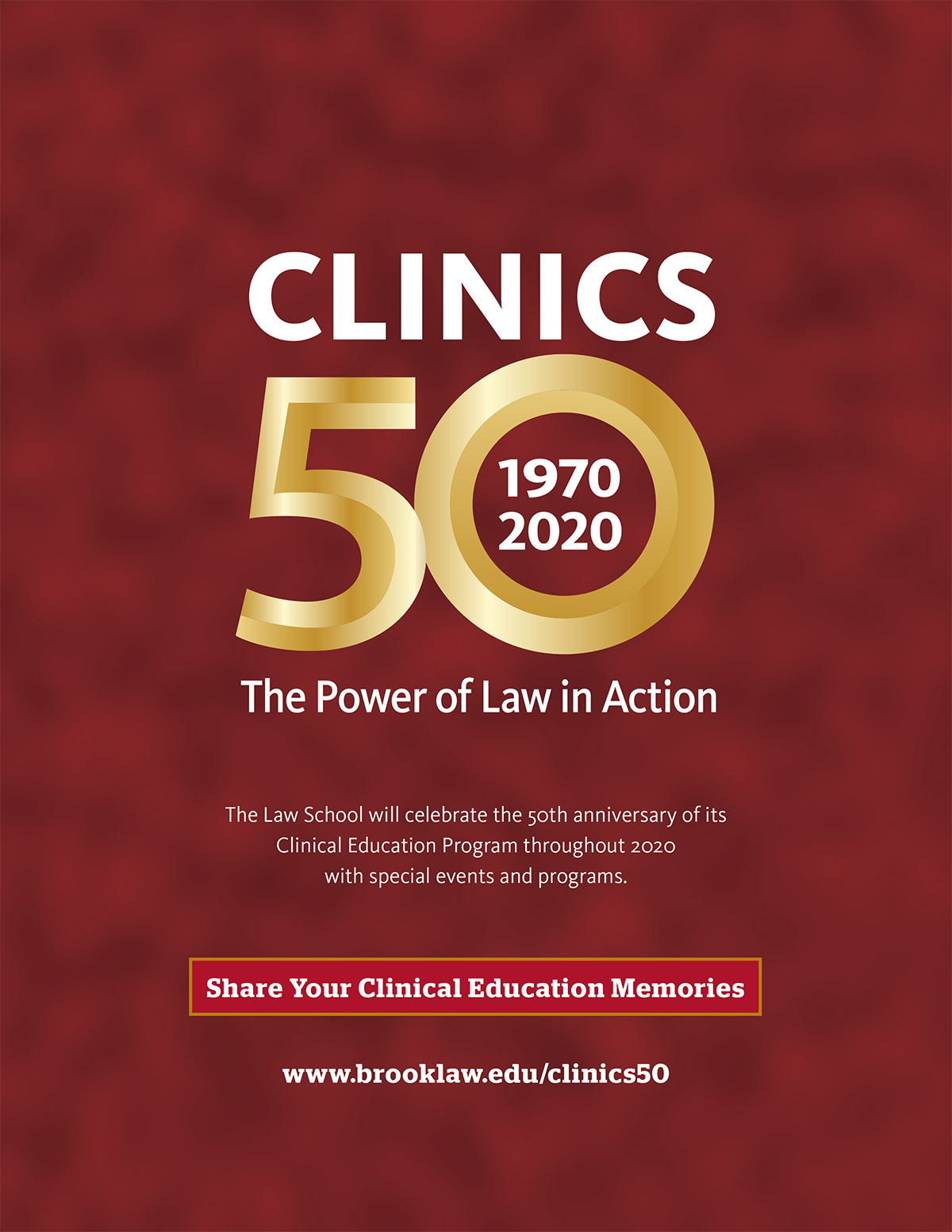Student Support Fund
- Assistance for partial or total loss of income
- Resources for remote learning
- Support for childcare issues or health concerns
- Physical or mental health support for themselves or their loved ones
- Significant disruption in living arrangements
- Other unforeseen emergencies
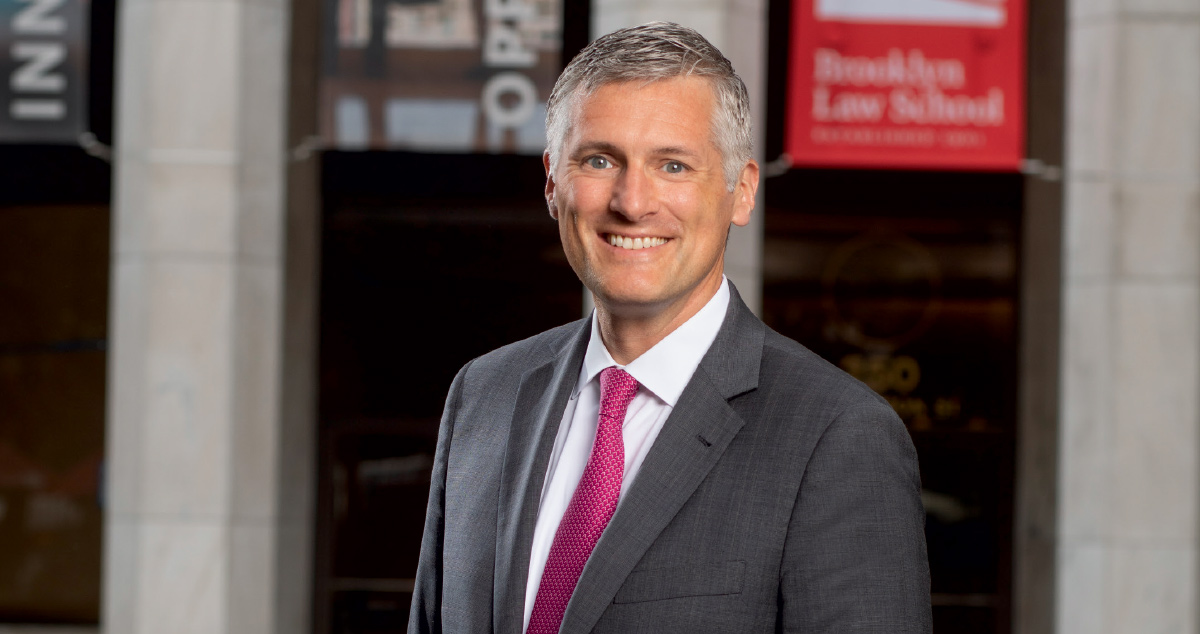
Since the articles in this issue of Law Notes were prepared for publication, our entire world has changed. You already know the big story, as you are living it too: a near-total shutdown of activity and direct human contact, with the work that can or must continue—in the law school’s case, the work of teaching and learning—taking place remotely, our remaining interactions mediated by technology of various kinds.
Yet alongside, and within, this big story are other, more positive and hopeful ones, making clear that our community persists; it is resilient; and it shall endure.
Executive Director of Communications
Jen Swetzoff
Knox Design Strategy
Caitlin Monck ’02
Peggy Swisher
Todd France
Samantha Lauren
Michael Meyer
Will O’Hare
Seth Olenick
Conor Sullivan
External Affairs
Brooklyn Law School
250 Joralemon Street
Brooklyn, NY 11201

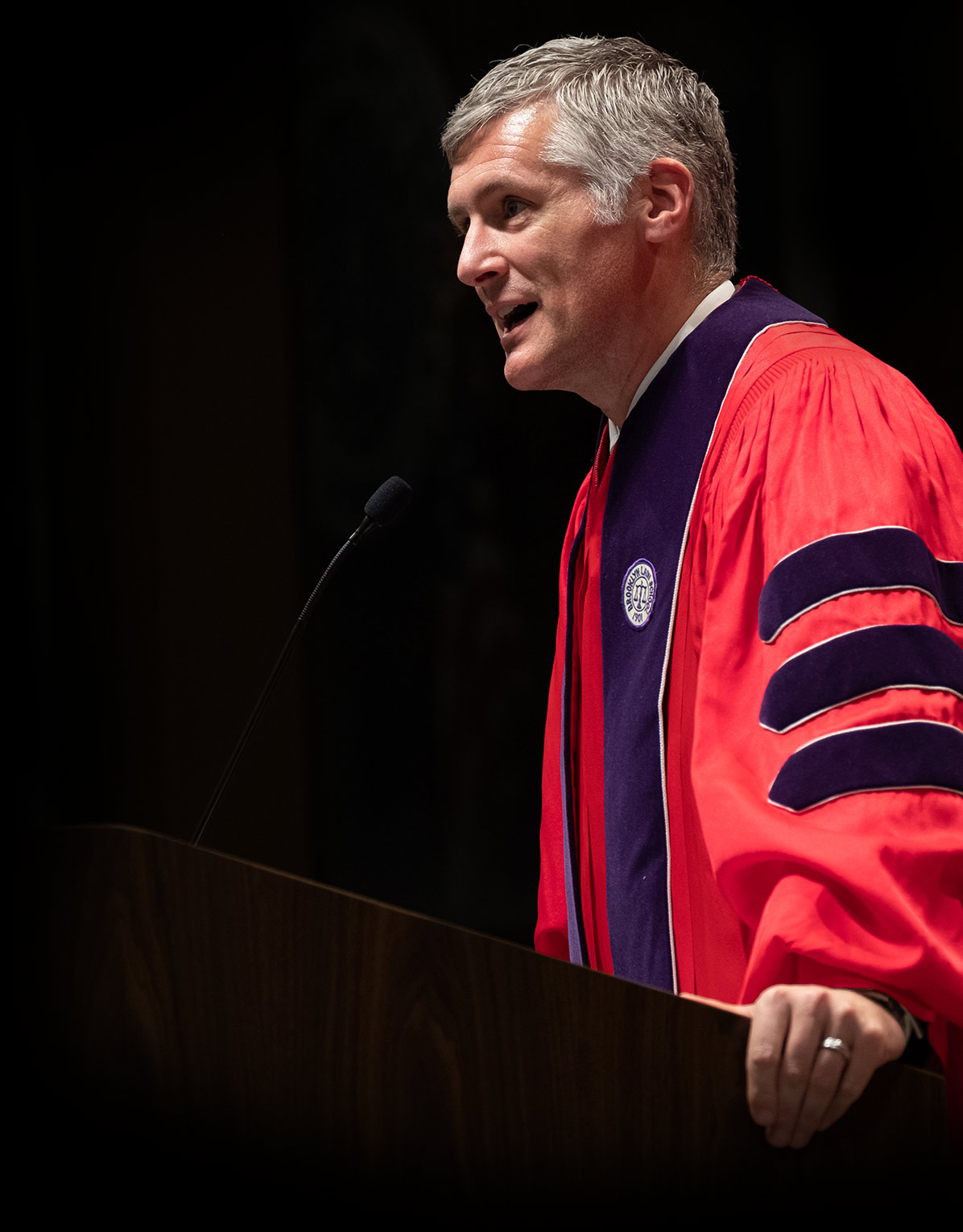
On October 23, 2019, Michael T. Cahill, President, Joseph Crea Dean and Professor of Law, was officially installed as the ninth dean of Brooklyn Law School. Over 200 alumni, trustees, faculty, students, staff, and friends attended the ceremony in the Law School’s Moot Court Room.
A series of distinguished speakers gave remarks to commemorate the event, including Stuart Subotnick ’68, chairman emeritus of the Board of Trustees; Brooklyn District Attorney Eric Gonzalez; Hon. Claire Kelly ’93 of the U.S. Court of International Trade and a member of the Board of Trustees; and Maryellen Fullerton, Suzanne J. and Norman Miles Professor of Law and interim dean of the Law School the prior year.
Francis J. Aquila ’83, Chairman of the Board of Trustees, served as emcee and oversaw the investiture of the dean, along with Student Bar Association leaders, who presided over Cahill’s official robing ceremony.

Brooklyn Law School announced the launch of the Professor Arthur Pinto and Stephen Bohlen Diversity Initiative, supported by a gift commitment of more than $1 million by Brooklyn Law School Professor Emeritus Arthur Pinto.
The Diversity Initiative, named for Pinto and his husband, Stephen Bohlen, a retired healthcare executive, will provide critical support for the Law School’s core commitment to creating an inclusive and welcoming environment for all members of its community: students, applicants, faculty, staff, alumni, and others, around the globe. It will support all aspects of the diversity and inclusion objectives advanced by Dean Cahill, the Board of Trustees, faculty, administrators, and staff.
“We are truly grateful for this generous gift that will have a significant impact on the Brooklyn Law School community for years to come,” said Cahill. “It will facilitate the Law School’s efforts to enhance the diversity of the legal profession, in New York City and beyond.”
“After teaching here for 34 years, Brooklyn Law School felt like my home, and my colleagues like family, so I am pleased to leave my mark in this way,” Pinto said. “It is my belief that an environment with diversity is a better environment, and it is my hope that the Law School continues to pursue the goals of inclusion and diversity.”
Pinto will also continue to support the Arthur Pinto Public Service Fellowship for LGBTQ Rights, created in 2017 and awarded annually to a student for work that supports LGBTQ rights law or represents LGBTQ individuals. At the Law School, Pinto was the codirector of the Dennis J. Block Center for the Study of International Business Law; faculty advisor for OUTLaws, the student organization that serves the needs of lesbian, gay, bisexual, transgender, queer, and straight allies within the Law School community; and director of the foreign summer study programs.
Brooklyn Law School announced the launch of the Professor Arthur Pinto and Stephen Bohlen Diversity Initiative, supported by a gift commitment of more than $1 million by Brooklyn Law School Professor Emeritus Arthur Pinto.
The Diversity Initiative, named for Pinto and his husband, Stephen Bohlen, a retired healthcare executive, will provide critical support for the Law School’s core commitment to creating an inclusive and welcoming environment for all members of its community: students, applicants, faculty, staff, alumni, and others, around the globe. It will support all aspects of the diversity and inclusion objectives advanced by Dean Cahill, the Board of Trustees, faculty, administrators, and staff.

“We are truly grateful for this generous gift that will have a significant impact on the Brooklyn Law School community for years to come,” said Cahill. “It will facilitate the Law School’s efforts to enhance the diversity of the legal profession, in New York City and beyond.”
“After teaching here for 34 years, Brooklyn Law School felt like my home, and my colleagues like family, so I am pleased to leave my mark in this way,” Pinto said. “It is my belief that an environment with diversity is a better environment, and it is my hope that the Law School continues to pursue the goals of inclusion and diversity.”
Pinto will also continue to support the Arthur Pinto Public Service Fellowship for LGBTQ Rights, created in 2017 and awarded annually to a student for work that supports LGBTQ rights law or represents LGBTQ individuals. At the Law School, Pinto was the codirector of the Dennis J. Block Center for the Study of International Business Law; faculty advisor for OUTLaws, the student organization that serves the needs of lesbian, gay, bisexual, transgender, queer, and straight allies within the Law School community; and director of the foreign summer study programs.
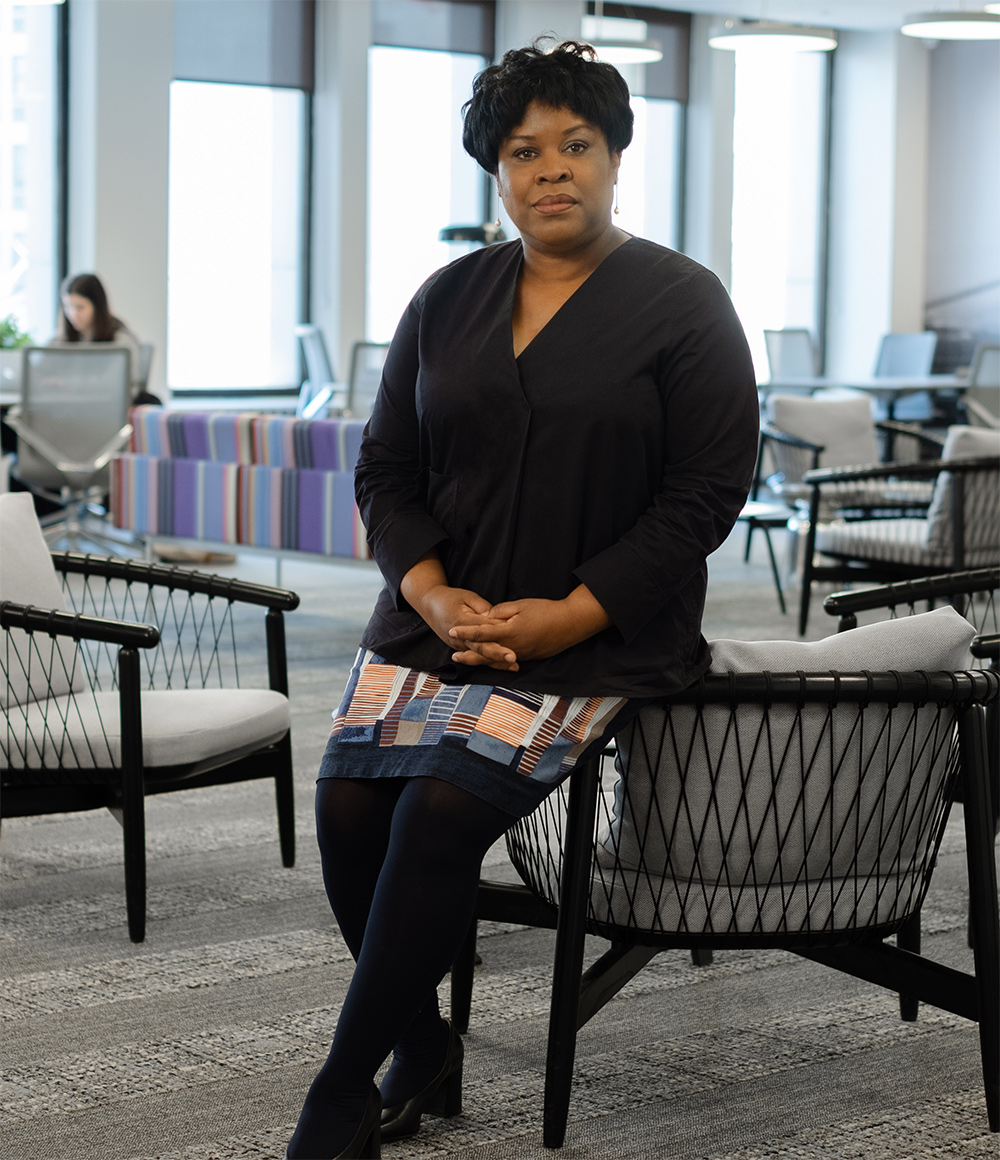
Professor Karen Porter to Lead New Inclusion and Diversity Initiative
Professor Karen Porter, a longtime member of the Brooklyn Law School faculty, has been named the inaugural Arthur Pinto and Stephen Bohlen Associate Dean for Inclusion and Diversity. In this newly created role, supported by a major gift from Professor Emeritus Arthur Pinto, she will oversee and coordinate the Law School’s efforts to ensure a diverse and inclusive environment.
“I am honored to hold this position in Professor Pinto’s name,” said Porter. “Having these resources provides a real opportunity to do significant work with the Law School community. My goal for my work in this role is to help change the narrative, not just for those traditionally underserved, but for the broader group of individuals who have felt disadvantaged, to feel they are being well served and can succeed.”
Porter, who joined the Law School in 2002, teaches Public Health Law and Policy, and serves as the executive director of the Law School’sCenter for Health, Science & Public Policy. She supervises the Center’s fellowship program, as well as the Health Law Externship.

Professor Karen Porter to Lead New Inclusion and Diversity Initiative
Professor Karen Porter, a longtime member of the Brooklyn Law School faculty, has been named the inaugural Arthur Pinto and Stephen Bohlen Associate Dean for Inclusion and Diversity. In this newly created role, supported by a major gift from Professor Emeritus Arthur Pinto, she will oversee and coordinate the Law School’s efforts to ensure a diverse and inclusive environment.
“I am honored to hold this position in Professor Pinto’s name,” said Porter. “Having these resources provides a real opportunity to do significant work with the Law School community. My goal for my work in this role is to help change the narrative, not just for those traditionally underserved, but for the broader group of individuals who have felt disadvantaged, to feel they are being well served and can succeed.”
Porter, who joined the Law School in 2002, teaches Public Health Law and Policy, and serves as the executive director of the Law School’sCenter for Health, Science & Public Policy. She supervises the Center’s fellowship program, as well as the Health Law Externship.
Chairman Emeritus Stuart Subotnick ’68 Honored with Portrait for Lifetime Service
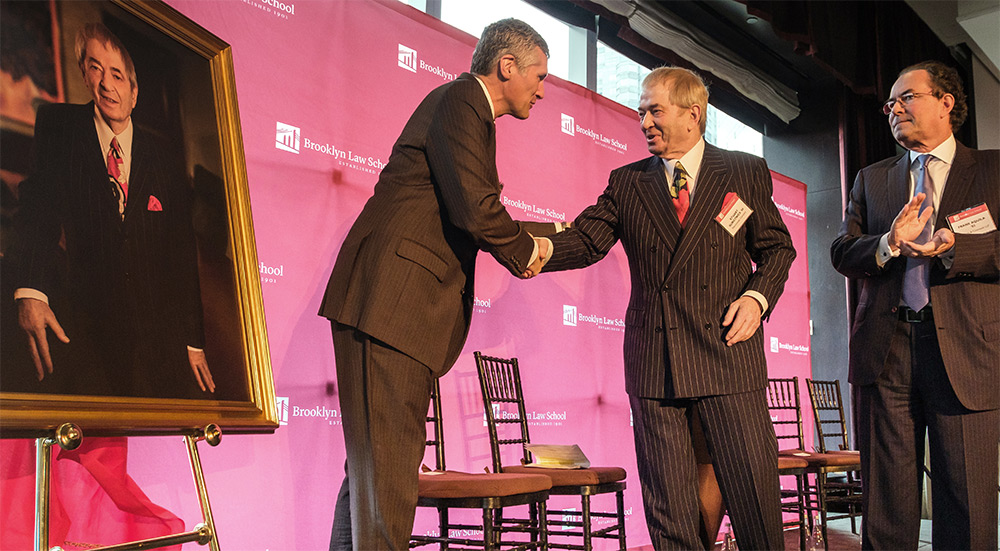
The portrait hangs at the Law School in the event space that bears his name, the Subotnick Center, along with those of past deans and other luminaries of the Law School.
Subotnick joined the Brooklyn Law School Board of Trustees in 1991, and served as its chairman from 2003 until 2019, when he was named chairman emeritus. He also has been an extraordinary benefactor, endowing the Anita and Stuart Subotnick Professor of Law chair, currently held by Professor Anita Bernstein, as well as two scholarships.

The portrait hangs at the Law School in the event space that bears his name, the Subotnick Center, along with those of past deans and other luminaries of the Law School.
Subotnick joined the Brooklyn Law School Board of Trustees in 1991, and served as its chairman from 2003 until 2019, when he was named chairman emeritus. He also has been an extraordinary benefactor, endowing the Anita and Stuart Subotnick Professor of Law chair, currently held by Professor Anita Bernstein, as well as two scholarships.
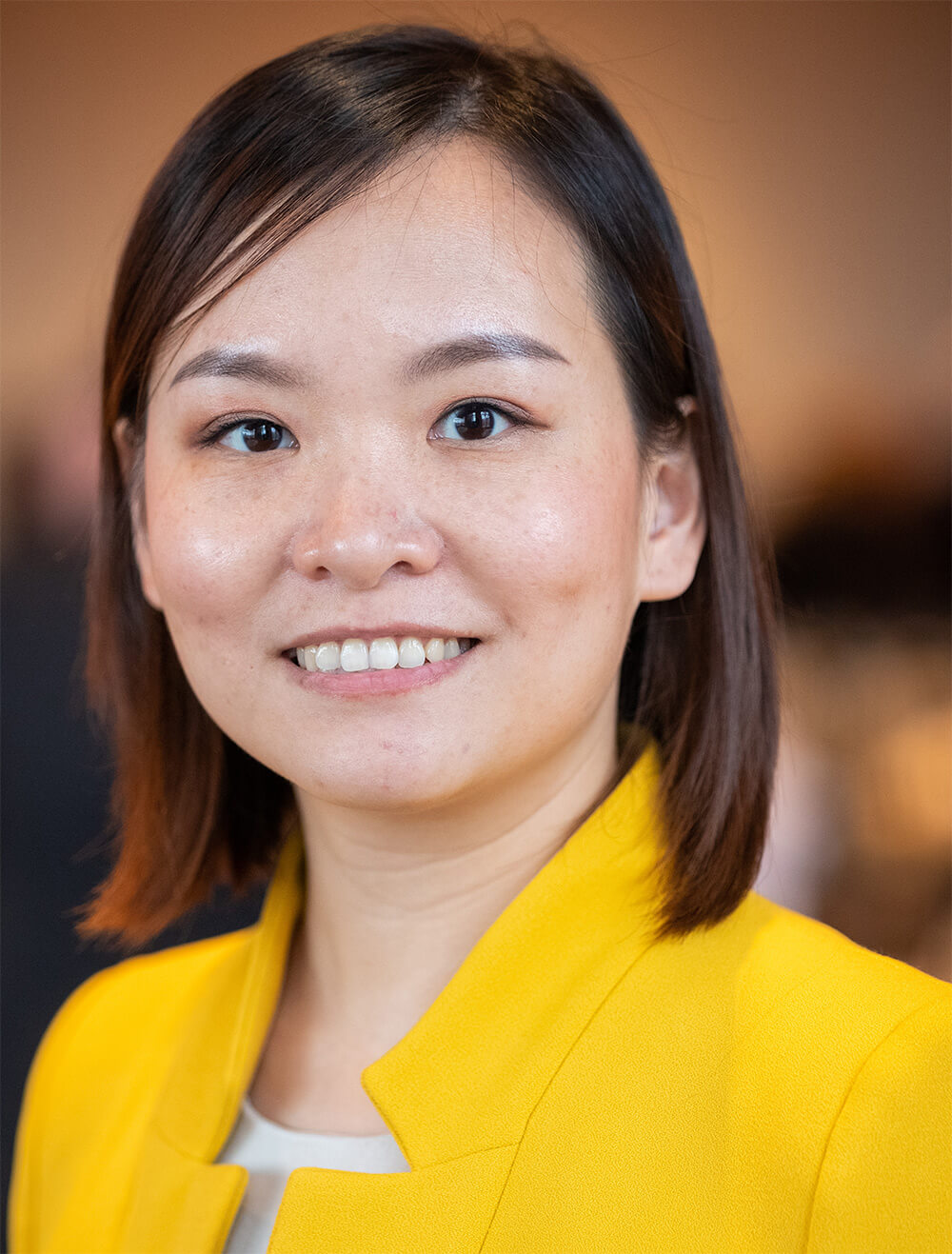
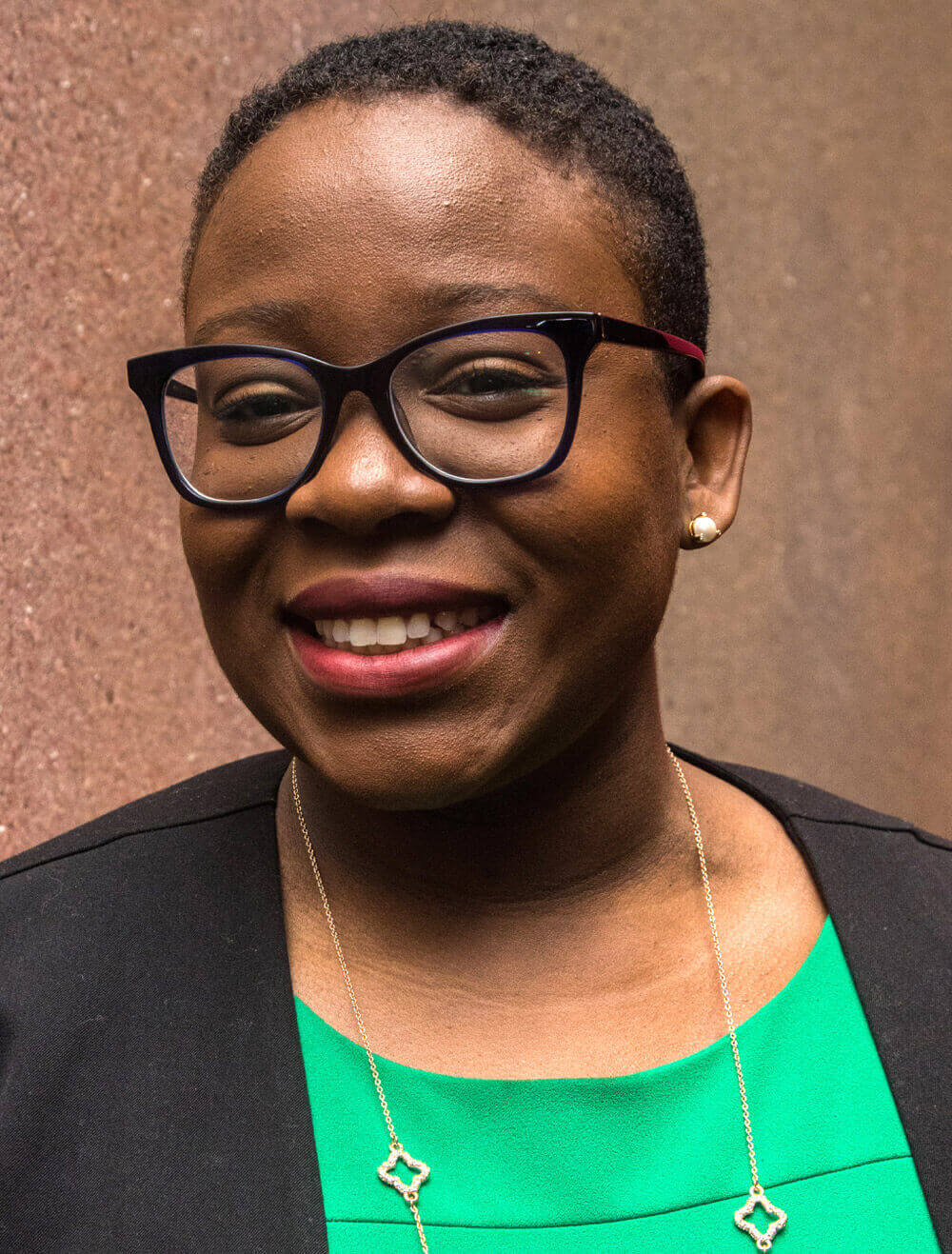
The Brooklyn Law School Board of Trustees has elected Dexin Deng ’16 and Garynn Noel ’15 as recent graduate trustees.
Dexin Deng is a law clerk for the Hon. Esther Salas of the U.S. District Court for the District of New Jersey. She did her undergraduate studies in biochemistry at the University of Leeds, and earned a paralegal certificate from Georgetown University. At Brooklyn Law School, she was an editor of the Brooklyn Journal of Corporate, Financial & Commercial Law, was a Health Law and Policy Fellow, and interned for the U.S. Department of Health and Human Services.
Garynn Noel is a vice president in the fixed income division at Morgan Stanley. She obtained her undergraduate degree in English and philosophy from Rutgers University. While in law school, Noel worked at Collen IP, Cullen and Dykman, and Neighborhood Defender Service of Harlem, and she interned at the Law School’s Office of the General Counsel. She was an editor of the Brooklyn Law Review, participated in the BLIP Clinic, and served in leadership roles in the Black Law Students Association.
“We are so pleased that Dexin and Garynn will be joining us on the board,” said Frank Aquila ’83, chairman of the Board of Trustees. “The success that they have each achieved in less than five years from graduation attests to both their individual abilities and the stellar preparation that they received at Brooklyn Law School. I’m certain that their insights will help us to innovate as we strive to remain at the forefront of legal education.”
At the town hall, moderated by Dean Cahill, Judge Dora L. Irizarry was joined by Glasser, Korman, Hershey Lord, and Reyes, along with Judges Ray Dearie and Lois Bloom, to discuss the role of the judiciary and share their personal experiences with students and faculty members.
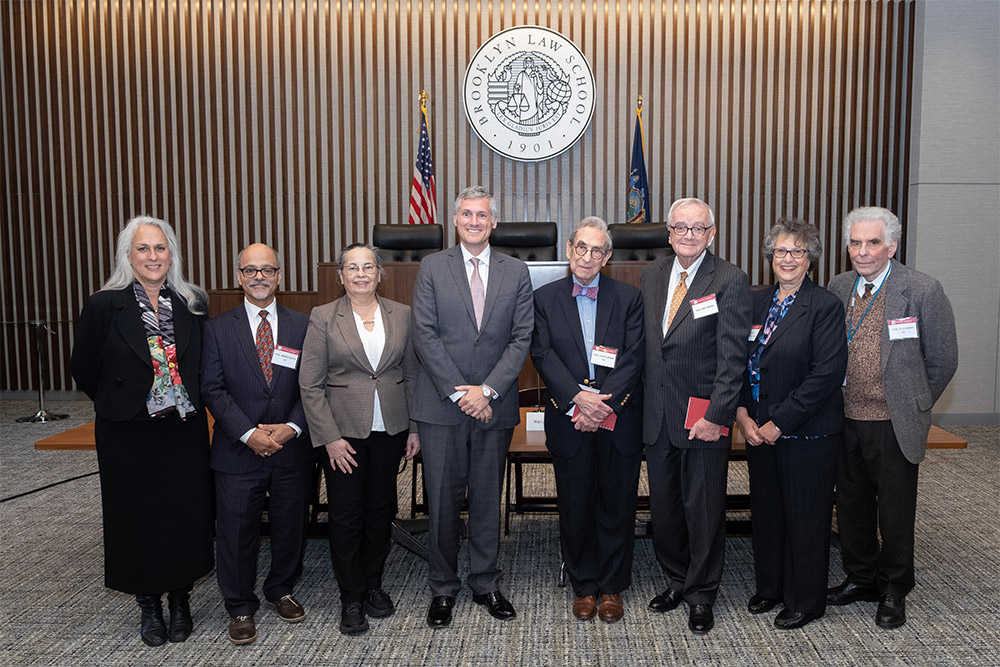
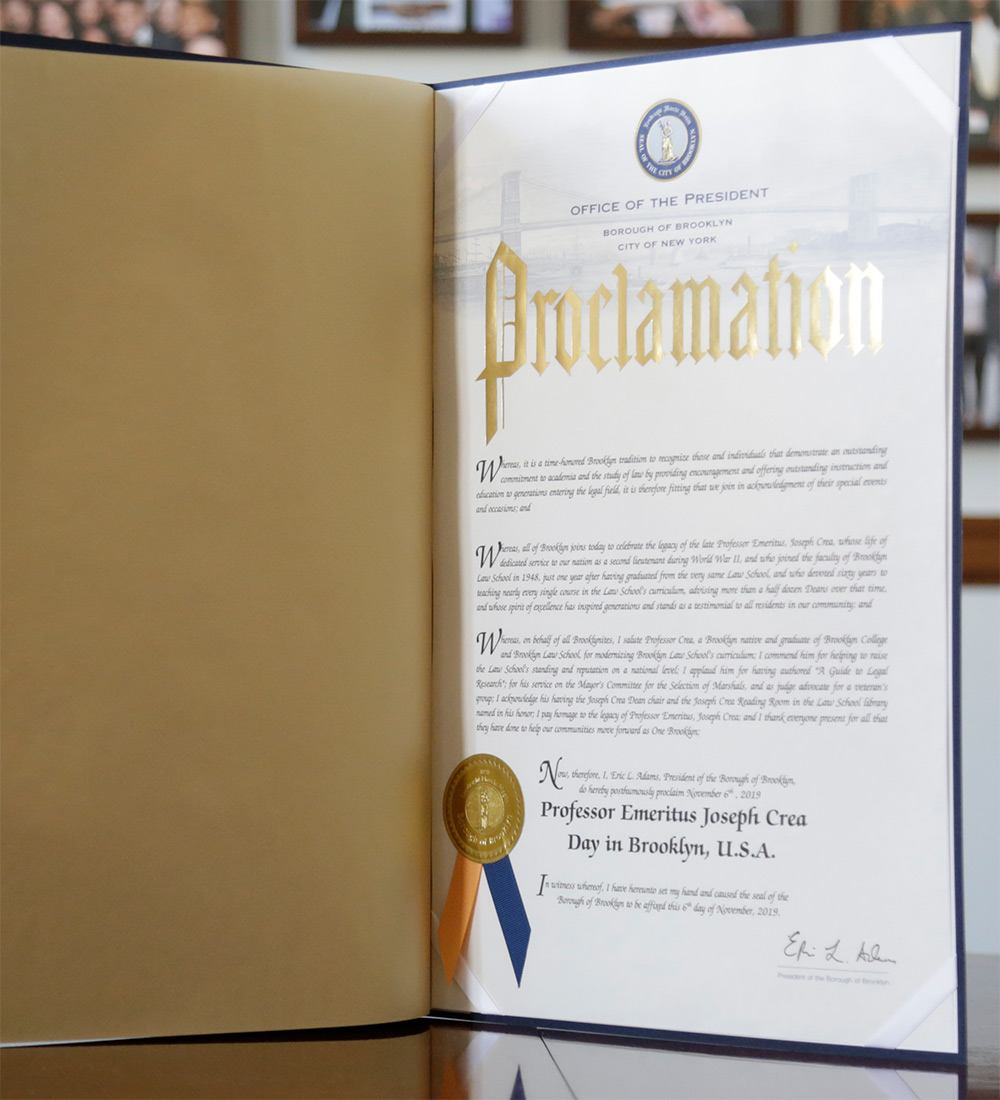
Crea, a member of the class of 1947, taught at the Law School for more than 60 years. He died August 2, 2019, at age 104.
At Business Boot Camp, Students Learn from Powerhouse Alumni
In Early January, Dean Cahill interviewed Stacy Kanter ’84, as the keynote for the eighth annual Business Boot Camp. Kanter, the former chair of the corporate finance practice at Skadden, Arps, Slate, Meagher & Flom, where she practiced for 30 years, and a founding member of Brooklyn Law School’s Women’s Leadership Circle, offered her experience and advice to students looking to enter corporate practice.
More than 50 students and 30 alumni participated in the boot camp, a four-day intensive course covering a range of topics at the intersection of law and business presented in collaboration with Deloitte Financial Advisory Services.

Evan Drake ’20, executive articles editor of the Brooklyn Journal of International Law, was one of 15 law students nationally to receive the Law360 Distinguished Legal Writing Award from the Burton Awards. He was honored for his note, “Sovereign Immunity for Russia’s Rocket Engines? Enforcing the ‘Yukos’ Award,” 45 Brooklyn Journal of International Law 367 (2019).
The Burton Awards honor the finest accomplishments in law, including writing, reform, public service and interest, regulatory innovation, and lifetime achievements in the profession. This year’s Legal Writing Award winners were chosen from nominations submitted by professors from around the country, and included winners hailing from top law programs.
“I am grateful to the editors of the Brooklyn Journal of International Law, past and present, for their support,” said Drake. “It has been a particular privilege to work with Professors Julian Arato, Jean Davis, and Max Shterngel, as well as Hon. Claire Kelly ’93, all of whose advice and encouragement made my note possible. They all taught me to ask the right questions.”
This is the third year in a row that a Brooklyn Law School student has won the prestigious writing award. Chloe Gordils ’19 and Alexa Bordner ’18 were selected for their notes in 2019 and 2018, respectively.
Jessica Olive ’20 and William Granados ’20 have been selected for postgraduate Immigrant Justice Corps (IJC) Fellowships. They will join 24 other fellows from top law schools to serve for two years as staff attorneys at legal services agencies and community-based organizations across the country. Inspired by Chief Judge Robert Katzmann of the U.S. Court of Appeals for the Second Circuit and launched in 2014, IJC is the nation’s first fellowship program wholly dedicated to meeting low-income immigrants’ needs for high-quality legal assistance.
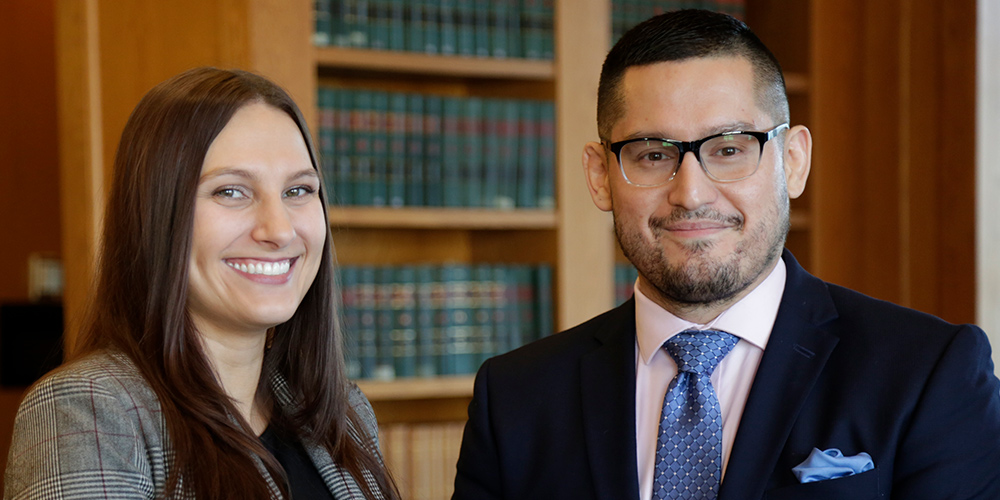
As an IJC Fellow, Olive will work with UnLocal, a nonprofit organization that provides direct immigration legal representation to New York City’s undocumented immigrant communities. Granados will join the New York Legal Assistance Group’s Immigrant Protection Unit, where he will gain experience in complex areas of immigration law.
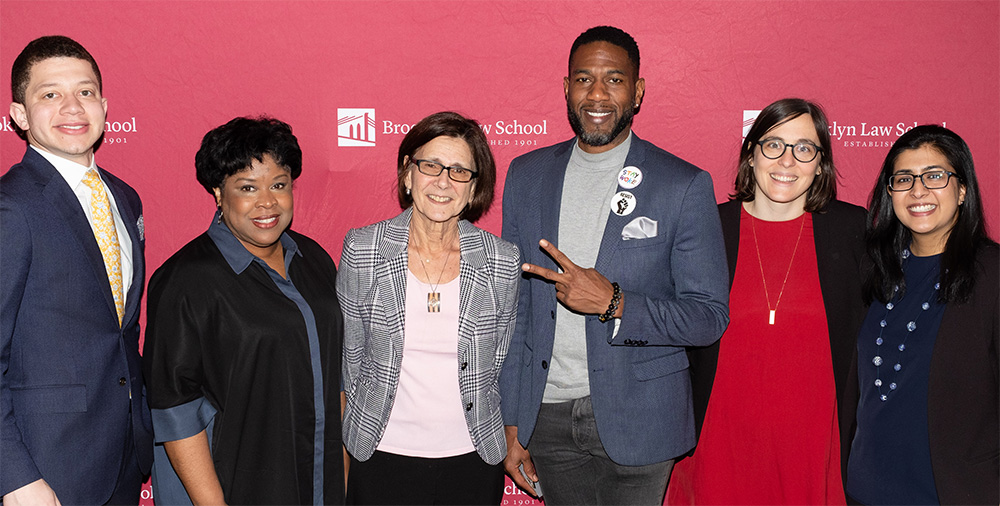
“I’m glad that places like Brooklyn Law School’s Disability and Civil Rights Clinic exist to make resources accessible, particularly to low-income communities,” said Williams. “Many people think they are facing these challenges alone. It is so important for us to organize, to reach out, and to bring people together under common concern.” Participants broke into working groups focused on different subject areas, where they shared knowledge and concerns and discussed strategies to enact progress.
The clinic is one of the few in the country focused on protecting and advancing the civil rights of adults with intellectual disabilities. It functions as a pro bono law firm, where students represent low-income New Yorkers and their families in a variety of civil legal matters.
The clinic’s work is made possible by a generous grant from the Taft Foundation. Howard Rothman ’71, president and chairman of the board of the Taft Foundation, has been instrumental in creating a successful partnership between the Foundation and the Law School.
“I’m glad that places like Brooklyn Law School’s Disability and Civil Rights Clinic exist to make resources accessible, particularly to low-income communities,” said Williams. “Many people think they are facing these challenges alone. It is so important for us to organize, to reach out, and to bring people together under common concern.” Participants broke into working groups focused on different subject areas, where they shared knowledge and concerns and discussed strategies to enact progress.

The clinic’s work is made possible by a generous grant from the Taft Foundation. Howard Rothman ’71, president and chairman of the board of the Taft Foundation, has been instrumental in creating a successful partnership between the Foundation and the Law School.
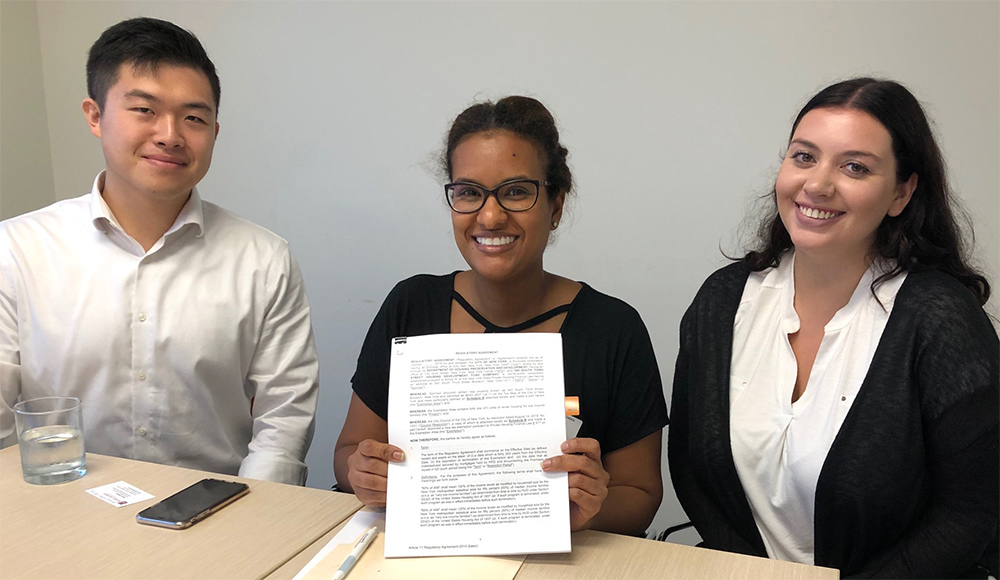
- Last fall, Nicole Ventura ’20 and Yu Xie ’20, students in the Corporate and Real Estate Clinic, successfully secured a real estate tax exemption and refund for the tenants of a 41-unit building in Williamsburg facing financial difficulties. The building, a not-for-profit tenant-controlled owner corporation, suffered without heat for two weeks last winter.
-
Students in the Disability and Civil Rights Clinic and the Safe Harbor Clinic collaborated to gain asylum for a refugee with severe cognitive difficulties. The client, a young man from a Central American country, was unable to testify on his own behalf because of the severity of his disability.
Rebecca Szczupakiewic ’20, Cory Bernstein ’20, Katherine Schloemer ’20, Mario Fitzgerald ’19, David Kass ’19, and Simone Lamont ’18 of the Disability and Civil Rights Clinic established the client’s credible fear of return, with Diego Gomez ’20, Pavel Williams ’20, and Will Granados ’20 assisting as interpreters.
Alex Hull ’20, Vilma Illic ’20, and LL.M. student Mary Gergis, working with the Safe Harbor Clinic under the supervision of Professor Carmen Maria Rey ’06, successfully argued the case in immigration court.
- Last fall, Nicole Ventura ’20 and Yu Xie ’20, students in the Corporate and Real Estate Clinic, successfully secured a real estate tax exemption and refund for the tenants of a 41-unit building in Williamsburg facing financial difficulties. The building, a not-for-profit tenant-controlled owner corporation, suffered without heat for two weeks last winter.

-
Students in the Disability and Civil Rights Clinic and the Safe Harbor Clinic collaborated to gain asylum for a refugee with severe cognitive difficulties. The client, a young man from a Central American country, was unable to testify on his own behalf because of the severity of his disability.
Rebecca Szczupakiewic ’20, Cory Bernstein ’20, Katherine Schloemer ’20, Mario Fitzgerald ’19, David Kass ’19, and Simone Lamont ’18 of the Disability and Civil Rights Clinic established the client’s credible fear of return, with Diego Gomez ’20, Pavel Williams ’20, and Will Granados ’20 assisting as interpreters.
Alex Hull ’20, Vilma Illic ’20, and LL.M. student Mary Gergis, working with the Safe Harbor Clinic under the supervision of Professor Carmen Maria Rey ’06, successfully argued the case in immigration court.
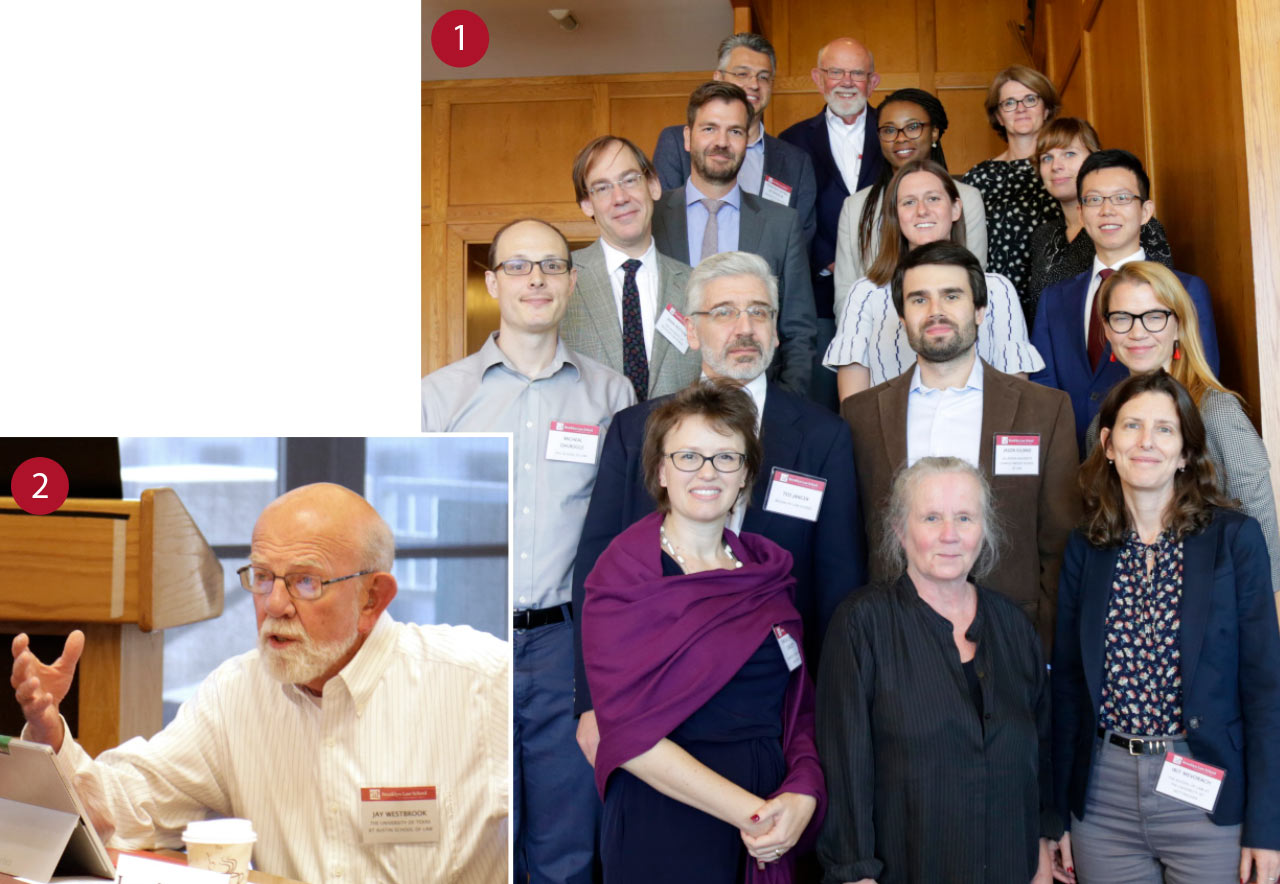
- Professor Edward Janger (row two, second from left) with the guest scholars
- Professor Jay L. Westbrook, UT-Austin School of Law
Historically, the SEC’s mission has been to protect investors; ensure fair, orderly, and efficient markets; and facilitate capital formation. However, Stein said, increasingly the agency is challenged by new technologies, innovative investment products, and computers trading securities instantaneously without human intervention.
“Market manipulation and fraud do not disappear. New forms of manipulation require us to adapt to the environment,” said Stein. She suggested that the same technologies that make fraud easier should be employed by the SEC in order to combat it, with care and human oversight. Investors, she said, need “trust and information. If either of these are missing, the markets freeze up.”
The Pomerantz Lecture series honors the life and work of Abraham L. Pomerantz ’24, who pioneered shareholder suits against major corporations. It focuses on topics of corporate securities law and related issues of professional responsibility. The Pomerantz law firm, of which Abraham Pomerantz was the founding partner, provides continuing support for the series. The lecture was sponsored by the Center for the Study of Business Law and Regulation and the Brooklyn Law Review.
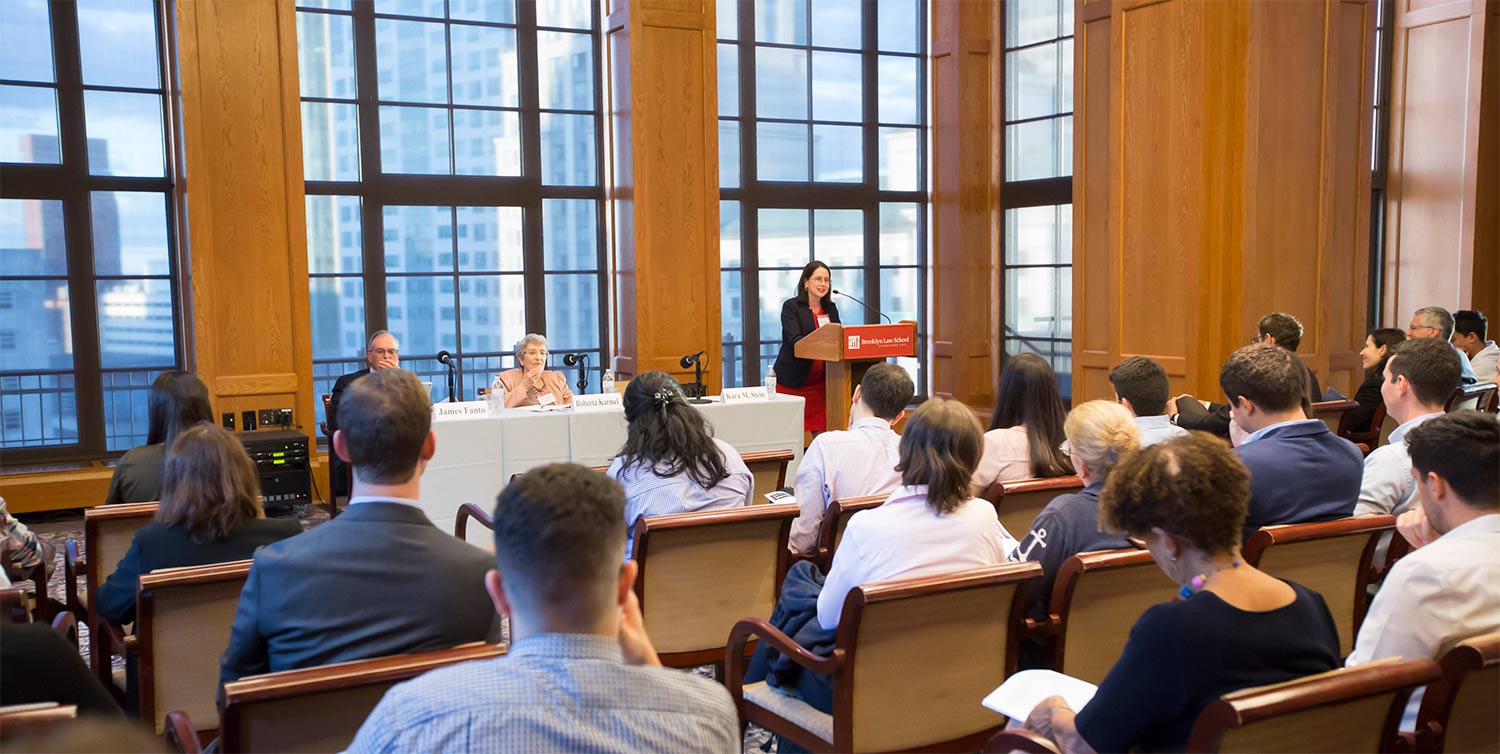
The forum also included events designed to assist students and new professionals interested in pursuing a career in international law.
“It was a special privilege to host the mid-year in Brooklyn—a true feast for our students and broader community,” said Professor Julian Arato, codirector of the Block Center, who was one of the three co-chairs of the Research Forum Committee. “Partnership with ASIL provides our law school community with an invaluable bridge to the world of international law. Our students have benefited from ample career-blazing opportunities afforded by the partnership program, access to the ASIL job board, and exposure to people and ideas at the ASIL Annual Meeting.” Arato was elected in April 2019 to the executive council of ASIL for a three-year term.
Other members of the faculty who participated in the conference included Professor Robin Effron, Block Center codirector, who was a discussant on the panel “International and Transnational Courts,” and Professor Maryellen Fullerton, who was a speaker on the panel “Navigating the Rising Tides of Nationalism,” part of the Practitioners’ Forum hosted by Debevoise & Plimpton the day prior.
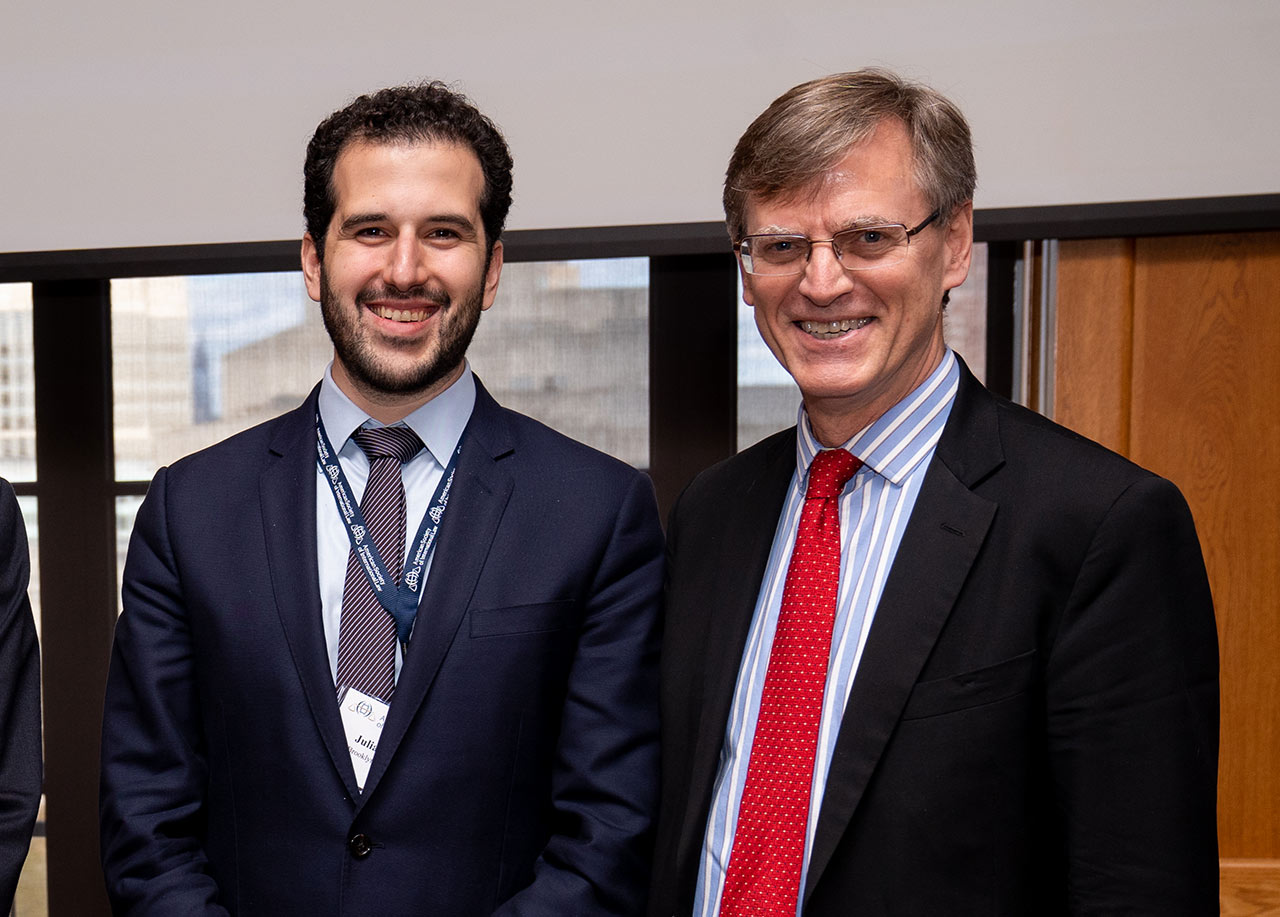
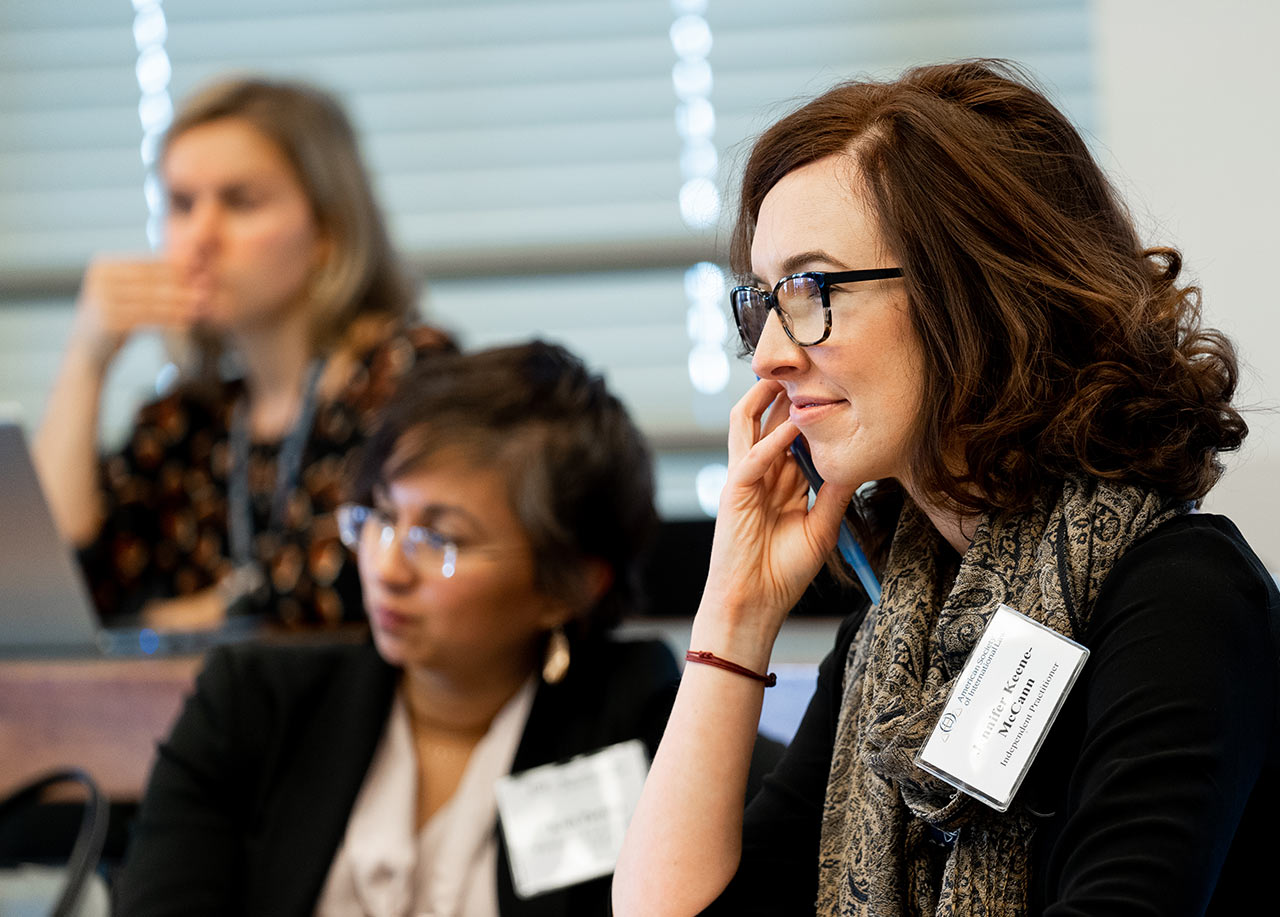
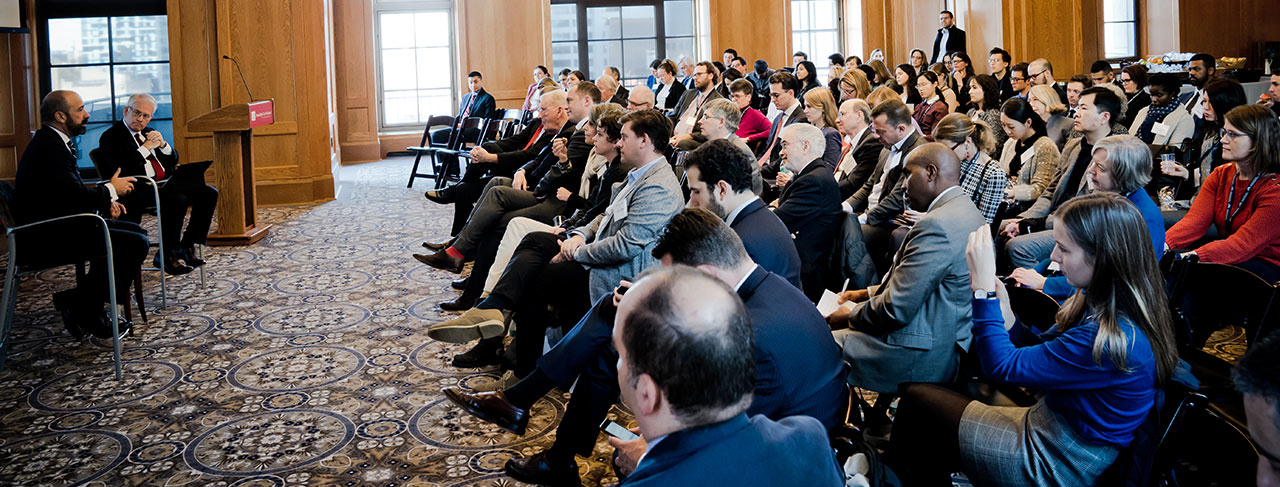

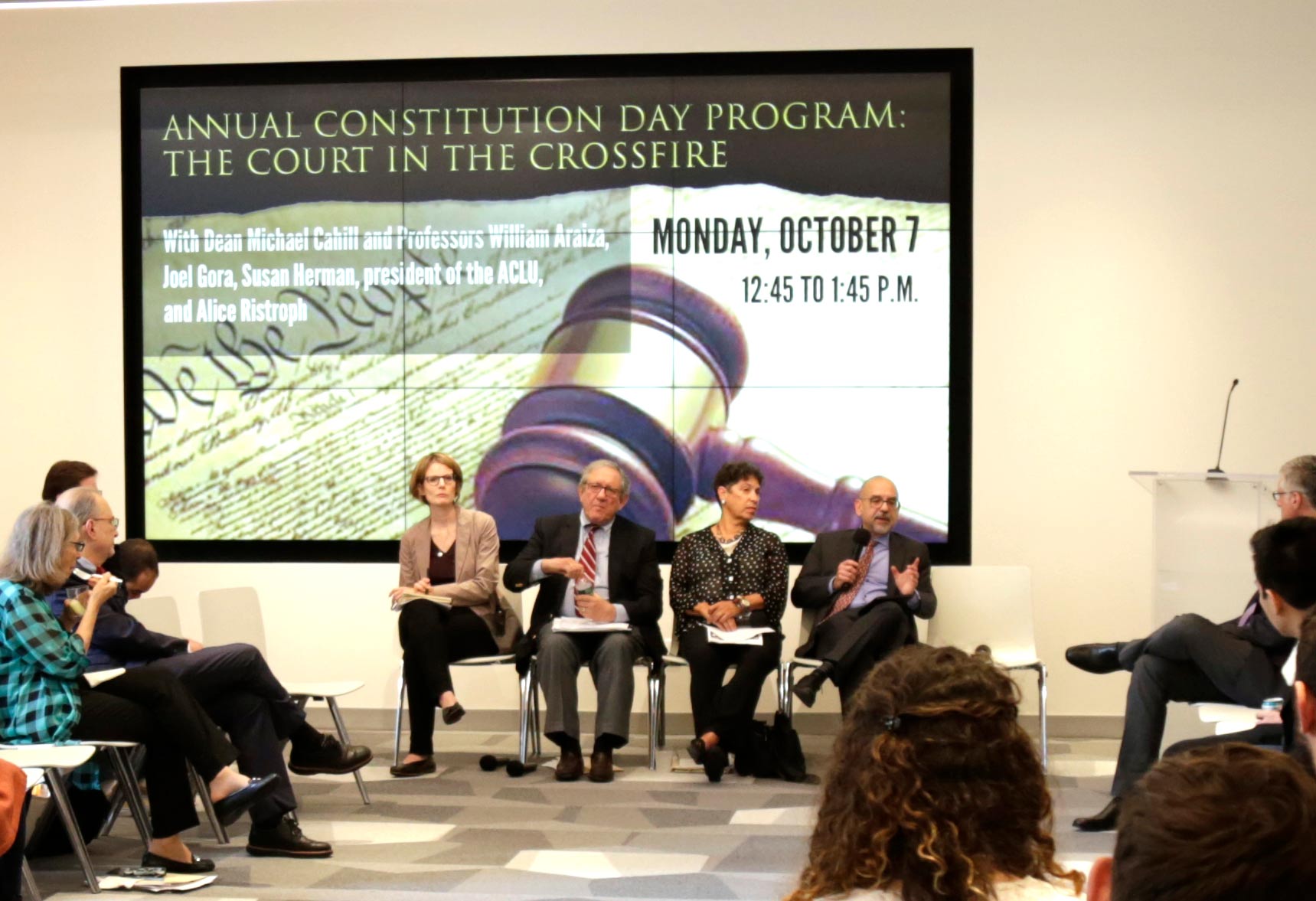
The dream of artificial intelligence (AI) in medicine—such as care robots, nanobots, and 3D-printed organs—inevitably comes up against the realities of policy and law, and the need for more responsibility and opportunity to collect and use better data. Pasquale explored this tension, and how healthcare and data policy can accelerate the development of medical AI.
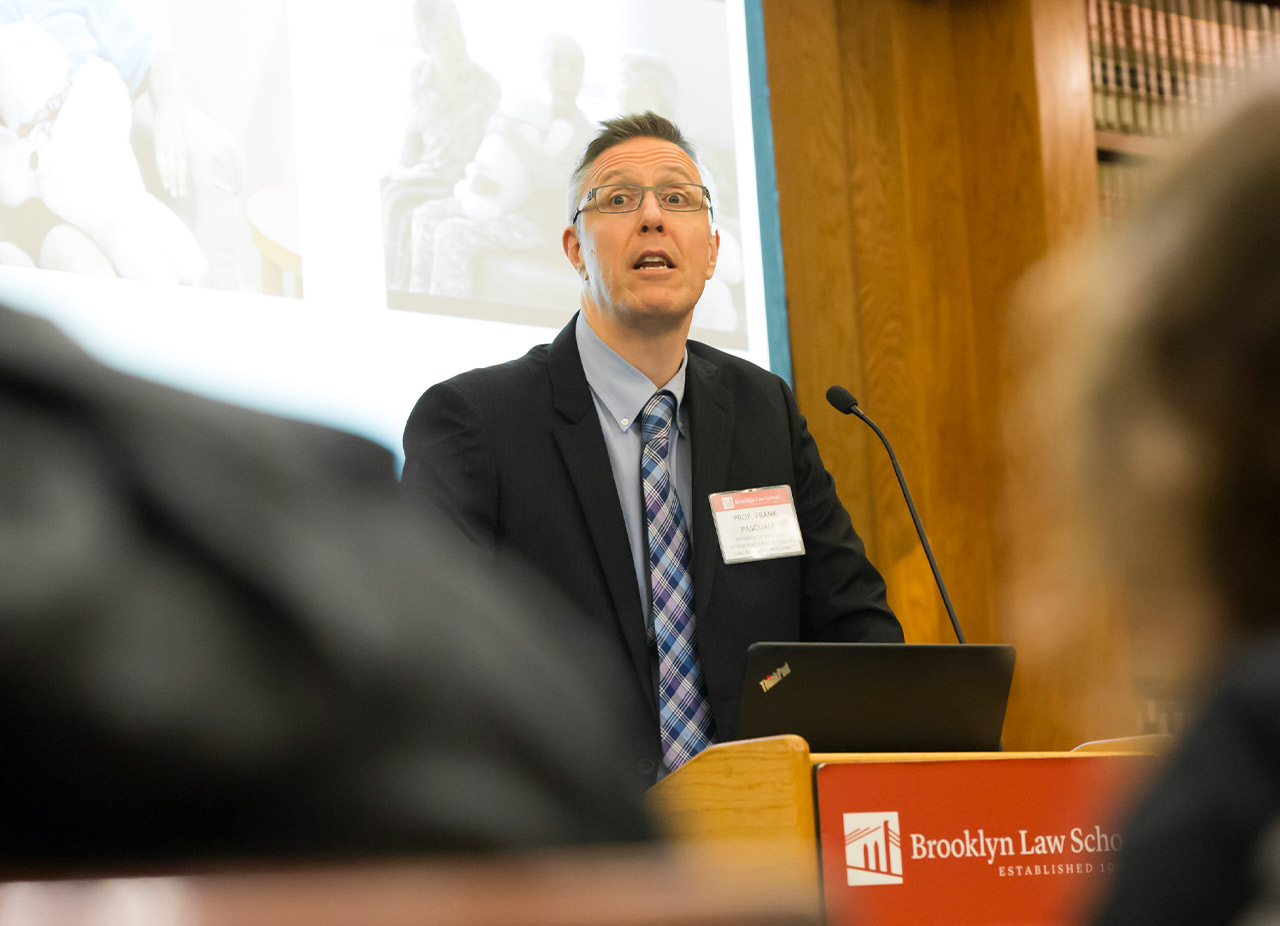
The program also featured leaders of the Mount Sinai Health System’s research group AISINAI: Director Eric Karl Oermann, M.D., instructor in the neurosurgery department; and Chief Operating Officer Anthony B. Costa, Ph.D., assistant professor of neurosurgery at Icahn School of Medicine at Mount Sinai.
The distinguished speakers included Richard Revesz, the Lawrence King Professor of Law and dean emeritus of New York University School of Law; Cary Coglianese, the Edward B. Shils Professor of Law at the University of Pennsylvania Law School; Ann Carlson, the Shirley Shapiro Professor of Environmental Law at UCLA School of Law; Katrina Kuh, the Haub Distinguished Professor of Environmental Law at Pace University Elisabeth Haub School of Law; John Vandenbergh, professor emeritus of zoology at North Carolina State University and his sons David Vandenbergh, professor of biobehavioral health at Penn State College of Health and Human Development, and Michael P. Vandenbergh, the David Daniels Allen Distinguished Chair of Law at Vanderbilt Law School; and Veronica Eady, the assistant executive officer of the California Air Resources Board.
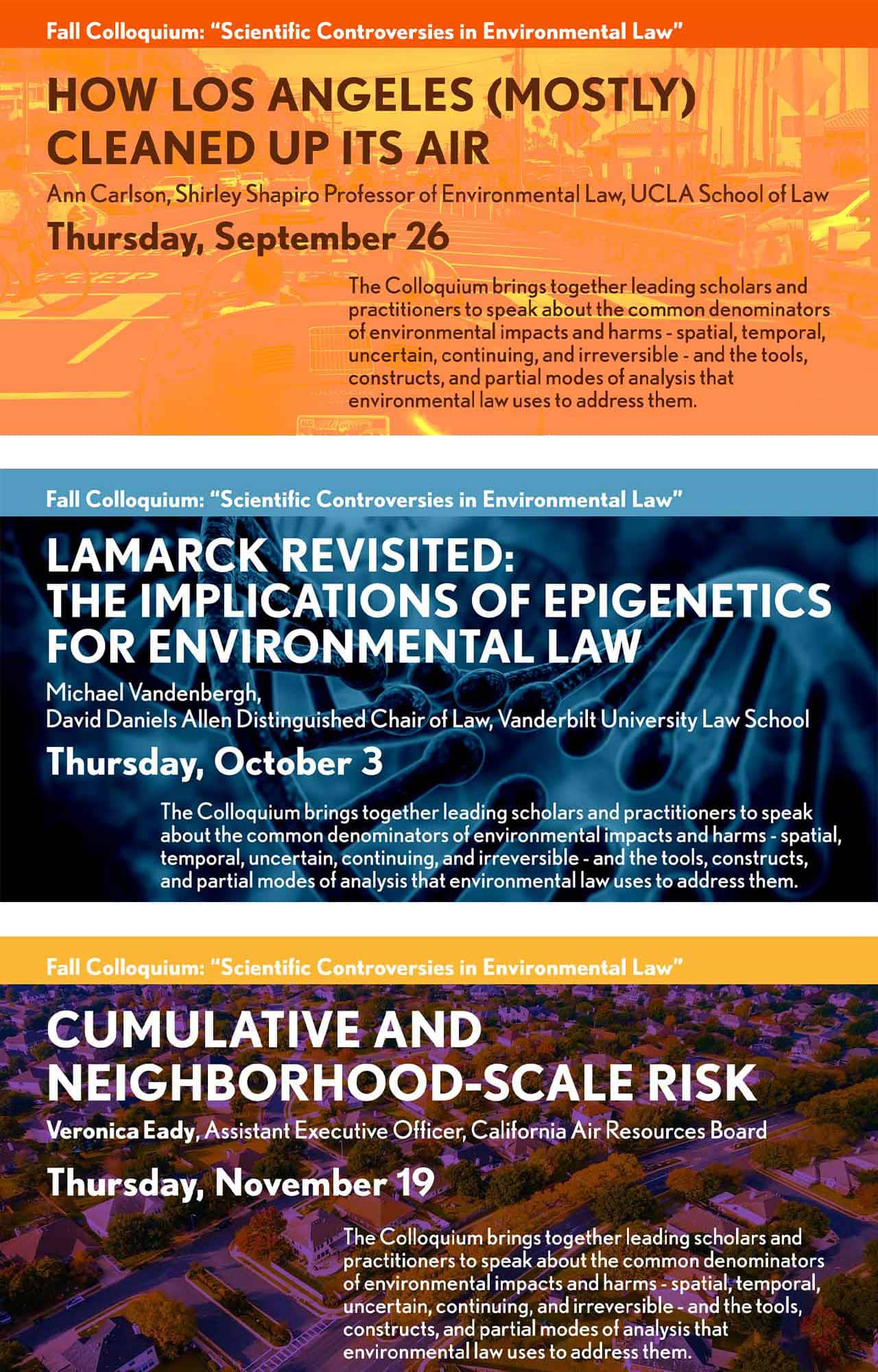





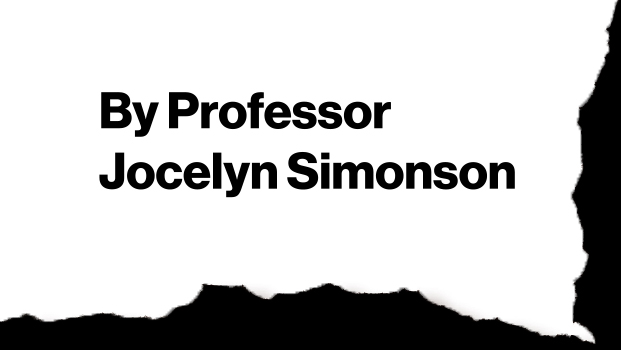
But what comes after money bail? As we think about pretrial detention, incarceration, and the criminal legal system more broadly, we need to widen the scope of our thinking beyond the relatively simple idea that “money bail is unfair to poor people” to a larger imagining about the harms of pretrial detention and even criminal adjudication itself. This requires pushing for a larger vision of how the state could provide safety and security in the face of both harm and structural neglect and connecting that vision to our systems of money bail and pretrial detention.
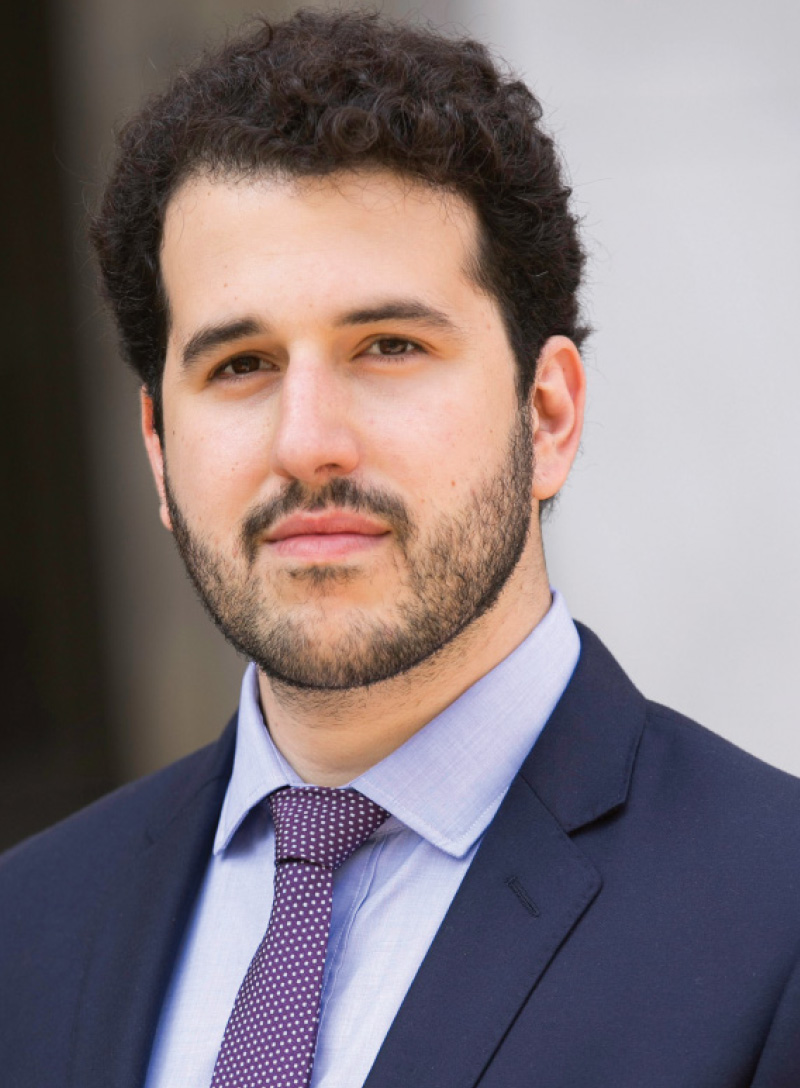
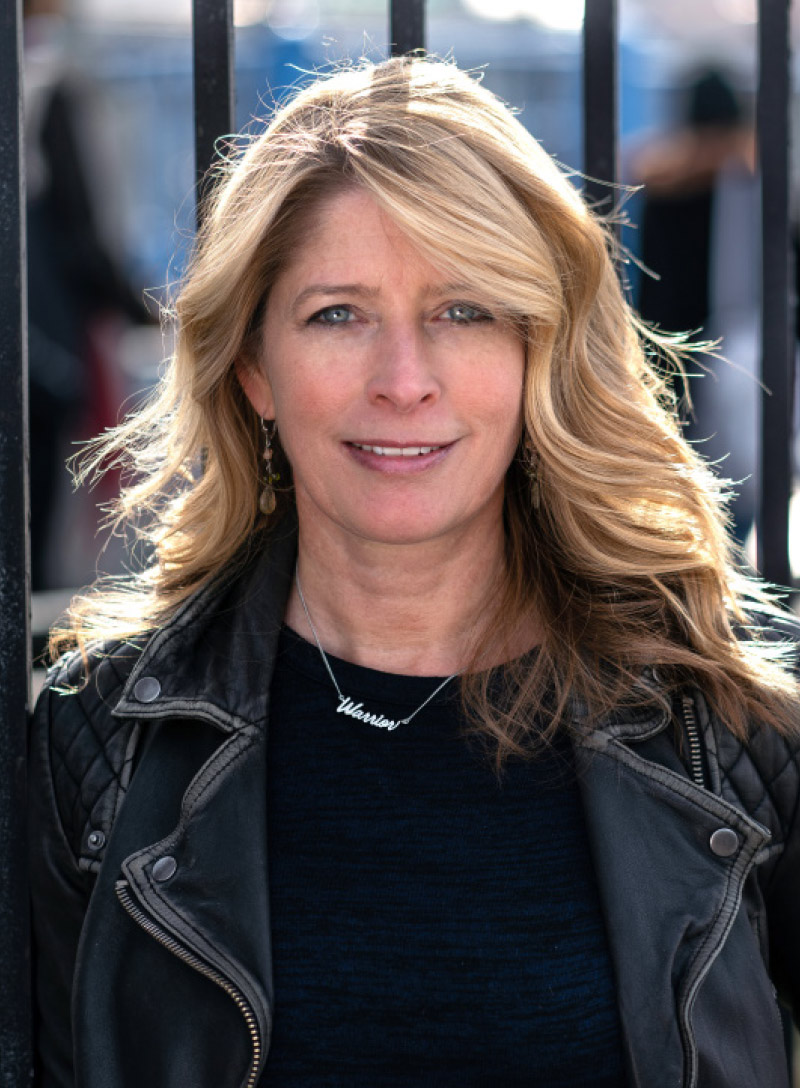
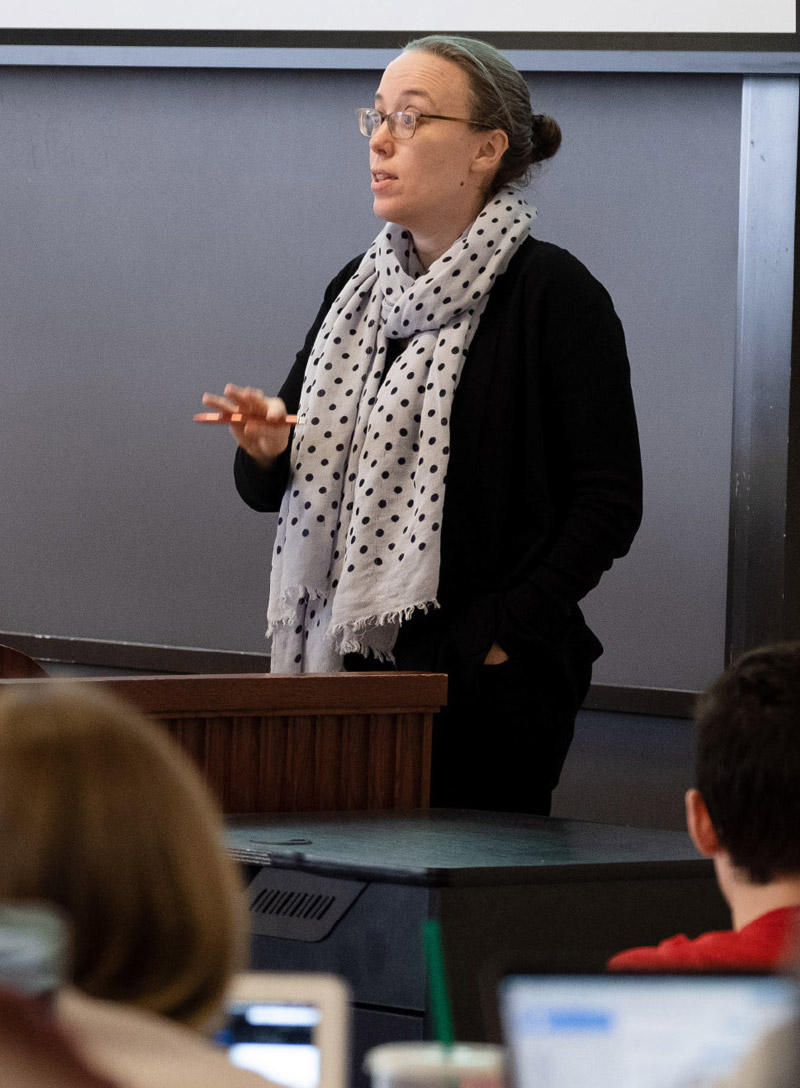
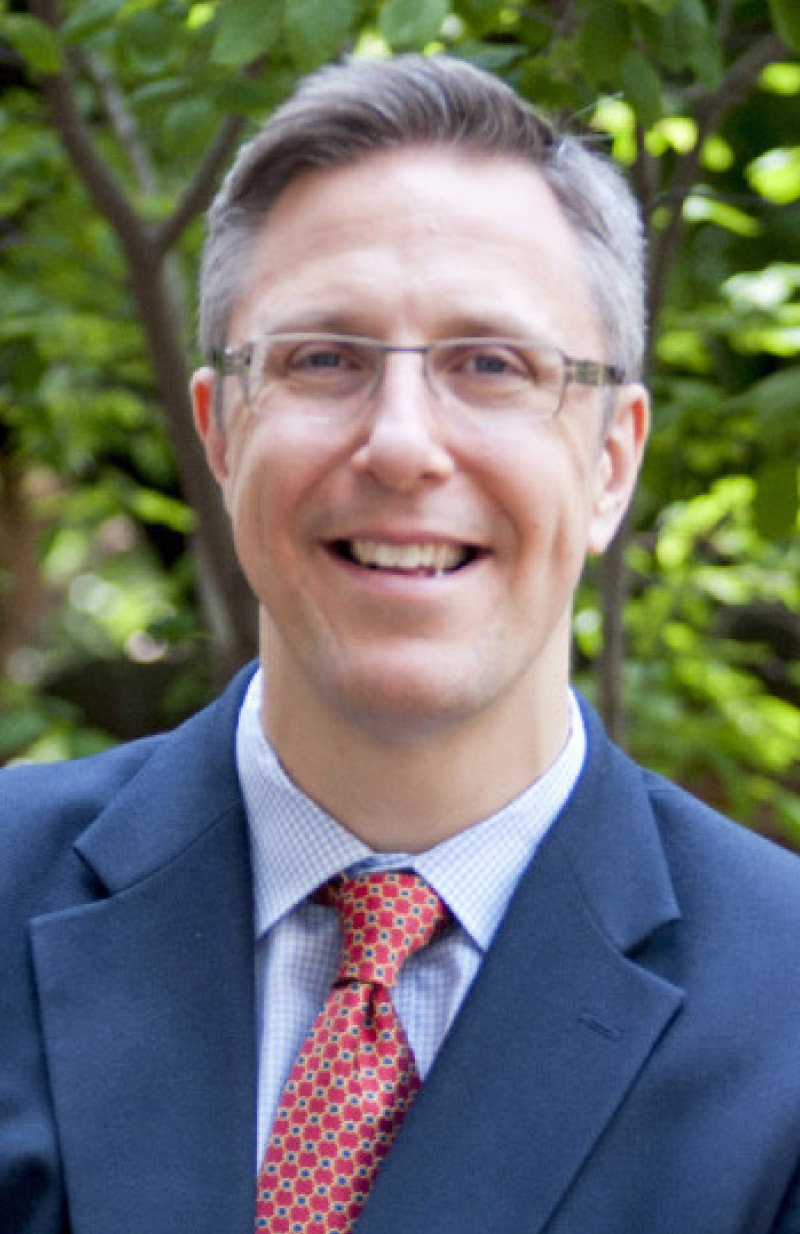
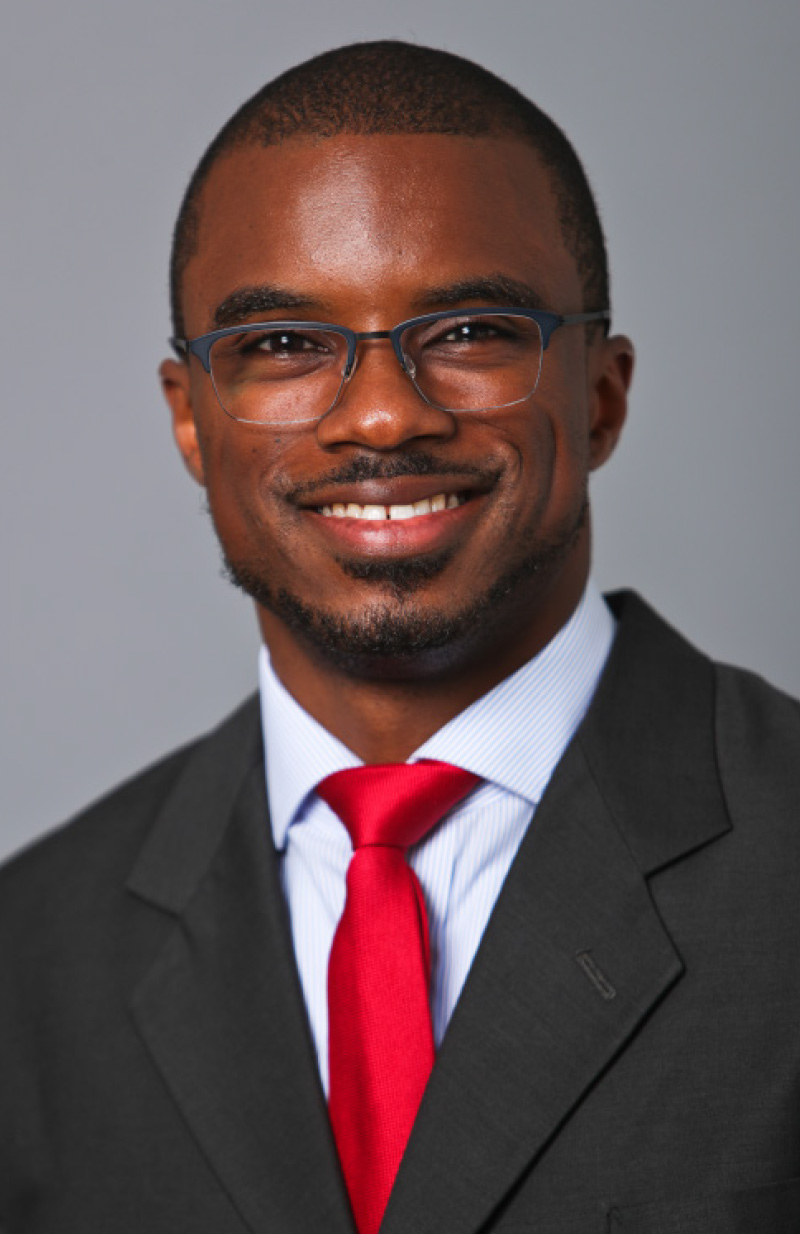
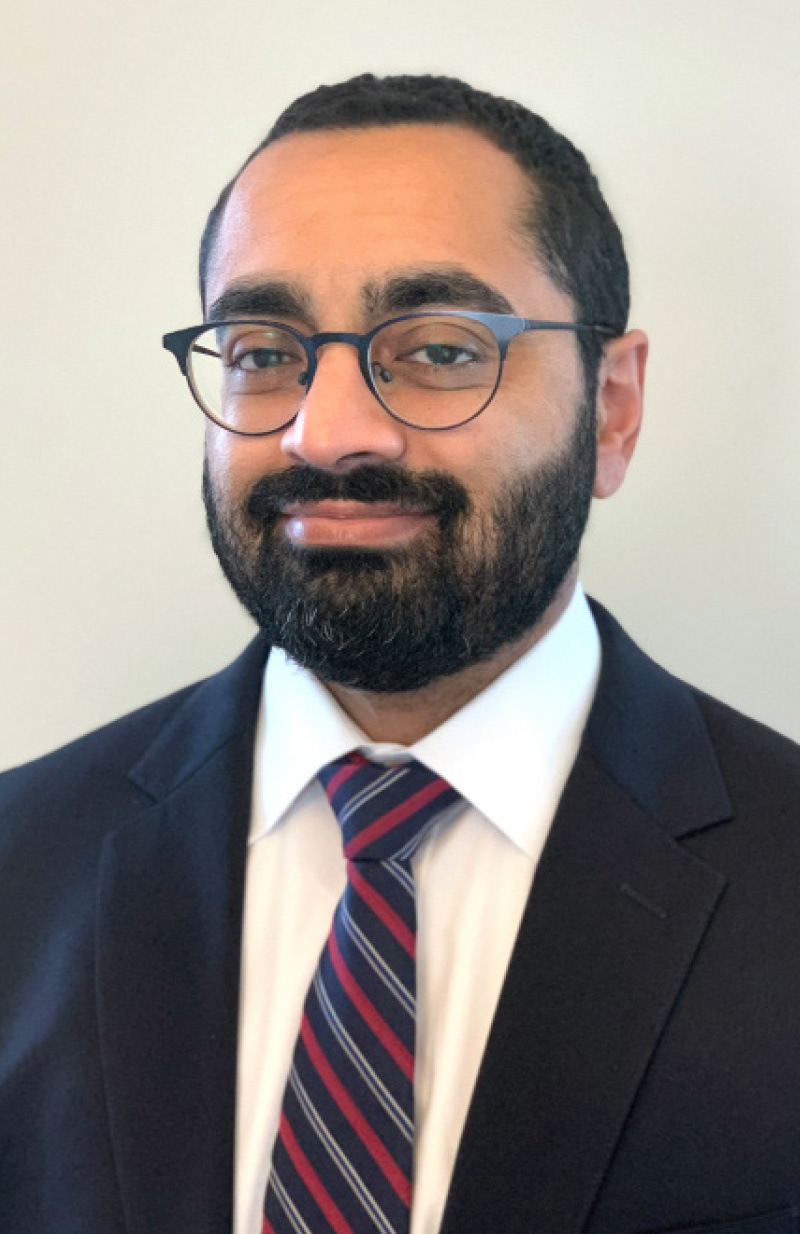
They will join an outstanding faculty that is nationally recognized for excellence in scholarship and teaching.
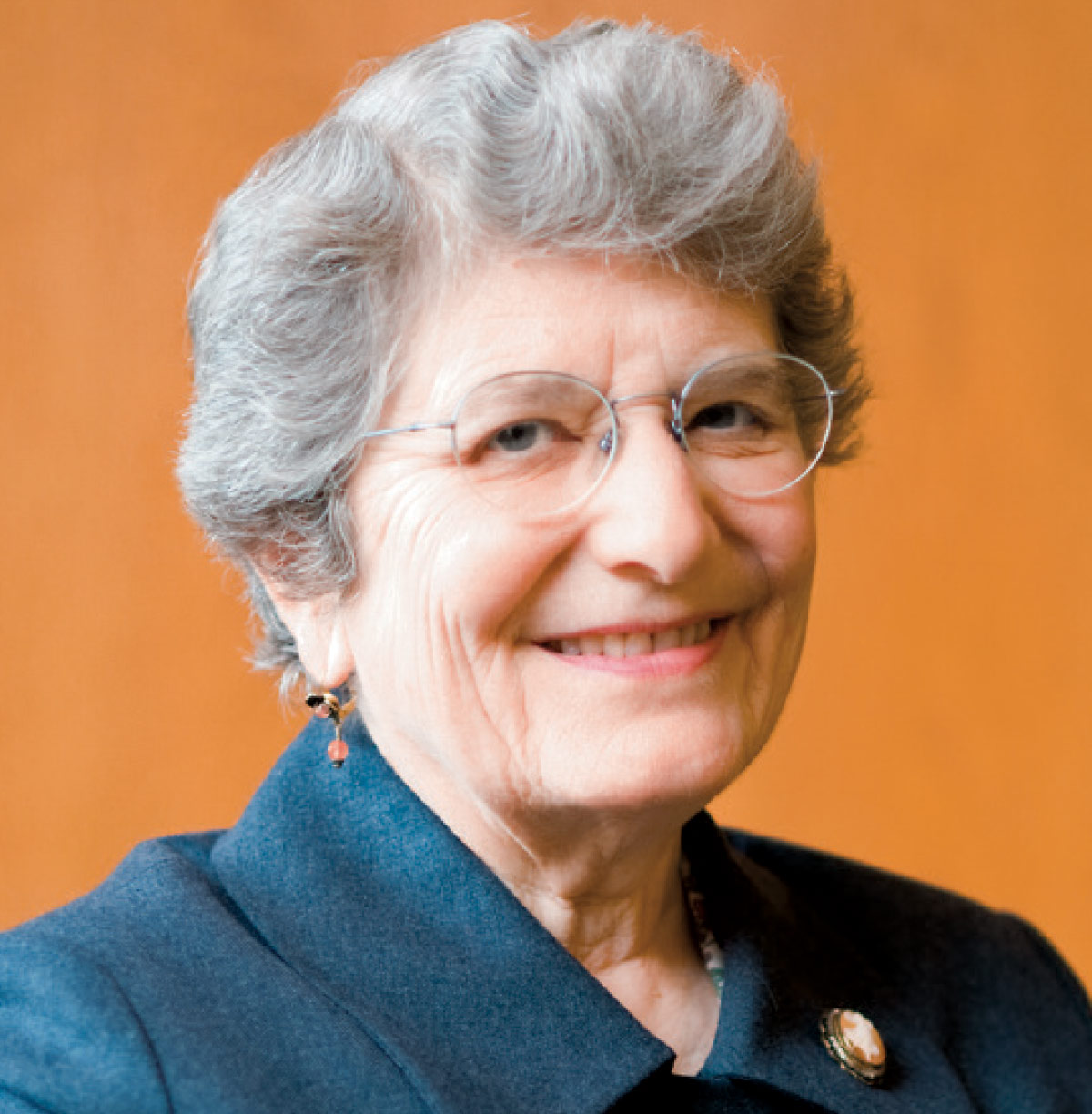
PROFESSOR ANDREW GOLD was elected to membership in the American Law Institute, the leading independent organization in the United States producing scholarly work to clarify, modernize, and otherwise improve the law. Gold is an expert in private law theory, fiduciary law, and the law of corporations, and associate director of the Center for the Study of Business Law and Regulation.
Professor Susan Herman was honored by the Dublin University Law Society of Trinity College, Dublin, with the Praeses Elit Award, in recognition of her leadership of the American Civil Liberties Union, where she serves as president. Past recipients include former U.N. ambassador Samantha Power and former South African president F.W. de Klerk.
PROFESSOR Edward Janger was elected a fellow of the American College of Commercial Finance Lawyers, a professional organization dedicated to promoting the field of commercial finance law through education, legislative reform, and the recognition of distinguished practitioners, jurists, and academics.
PROFESSOR SAMUEL MURUMBA was named a life member by the American Law Institute. He is an expert in the fields of intellectual property and human rights and, among his many distinctions, is emeritus director of the Human Rights Watch Board of Directors.

PROFESSOR ANDREW GOLD was elected to membership in the American Law Institute, the leading independent organization in the United States producing scholarly work to clarify, modernize, and otherwise improve the law. Gold is an expert in private law theory, fiduciary law, and the law of corporations, and associate director of the Center for the Study of Business Law and Regulation.
Professor Susan Herman was honored by the Dublin University Law Society of Trinity College, Dublin, with the Praeses Elit Award, in recognition of her leadership of the American Civil Liberties Union, where she serves as president. Past recipients include former U.N. ambassador Samantha Power and former South African president F.W. de Klerk.
PROFESSOR Edward Janger was elected a fellow of the American College of Commercial Finance Lawyers, a professional organization dedicated to promoting the field of commercial finance law through education, legislative reform, and the recognition of distinguished practitioners, jurists, and academics.
PROFESSOR SAMUEL MURUMBA was named a life member by the American Law Institute. He is an expert in the fields of intellectual property and human rights and, among his many distinctions, is emeritus director of the Human Rights Watch Board of Directors.
Progress Is Possible: Sustainability in U.S. Corporate Law and Corporate Governance, in The Cambridge Handbook of Corporate Law, Corporate Governance and Sustainability (B. Sjåfjell & C. Bruner, eds., Cambridge University Press, 2019)
BRAKMAN REISER EXPLAINS how legal innovations, such as benefit corporations and sustainability disclosures, can incorporate sustainability as part of broader corporate practice. She argues that although there are few legal barriers to U.S. corporations pursuing sustainability, the shareholder-oriented corporate and business environment will require that the drive for pursuing such changes come from asset owners and the markets themselves.
Designing Corporate Leniency Programs, in The Cambridge Handbook on Compliance (D. Sokol & B. van Rooij, eds., Cambridge University Press, forthcoming)
BAER EXAMINES recent developments in the Department of Justice’s stance toward corporate offenders to illustrate how the framing and design of a corporate leniency program influence its performance. She finds that a program’s close ties between corporate targets and government enforcers, while generating trust, may simultaneously create credibility problems in the eyes of the public.
The Right of Redress (Oxford University Press, forthcoming 2020)
GOLD OFFERS a pathbreaking account of the rights of victims to seek redress in private law, including the underlying political theory and the contemporary features that shape our rights of redress today. He makes sense of tort, contract, and fiduciary law, and unjust enrichment doctrine, and draws on public fiduciary theory to develop a distinctive account of the state’s role and responsibilities in redress.
The Institutional Design of Community Control, 108 California Law Review__ (forthcoming 2020)
A growing set of social movements have revived interest in “community control,” the idea that local residents should exercise power over government services. Rahman and Simonson look at two current proposals—community control of the police and community control of local economic development—to develop a broader framework for analyzing how local governance institutions might shift power and attempt to redress inequality.

An expert on the intersection of the fields of linguistics and law, Solan plans to work with the Birmingham Law School to establish a center similar to Brooklyn’s Center for the Study of Law, Language and Cognition, of which Solan is the director. In addition, he will continue developing his book, Language and Law: A Collision Course (working title), based on a series of lectures he gave at the Summer Institute of the Linguistic Society of America at the University of Chicago. Solan, a prolific scholar, is the author of several highly regarded books and dozens of chapters and articles in this area.
“I am thrilled with the opportunity to interact with highly regarded legal scholars in the field of legislation and statutory interpretation to develop my own scholarship,” said Solan. “The U.K. boasts the world’s greatest concentration of scholars and university programs in language and law, and Birmingham is the hub of this activity. I look forward to contributing to the language and law scholarship there.”
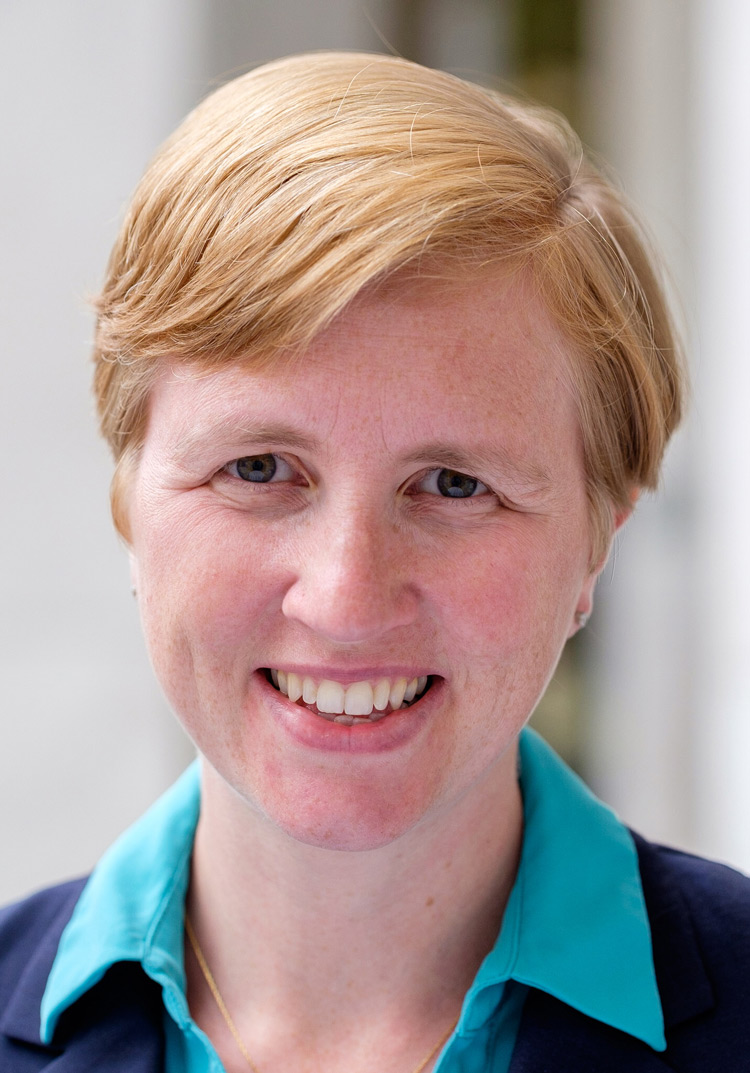
Hazeldean’s teaching, scholarship, and law practice focus on gender, sexual orientation, immigration, and civil rights. Under her direction, students in the LGBT Advocacy Clinic represent clients who face discrimination based on their sexual orientation or gender identity.
“We are thrilled to congratulate Professor Hazeldean on this richly deserved honor,” said Professor Stacy Caplow, associate dean of experiential education. “Since she joined the Law School just three years ago, she has proven herself to be an exceptional leader in advancing LGBTQ+ rights and clinical education, and makes it clear to our students, faculty, and staff that inclusion of LGBTQ+ people is a vital part of our mission at Brooklyn Law School.”
Previously, Hazeldean taught at Cornell Law School and Yale Law School. Prior to her academic career, Hazeldean directed the Peter Cicchino Youth Project at the Urban Justice Center in New York, providing free legal representation to homeless and at-risk LGBT youth.
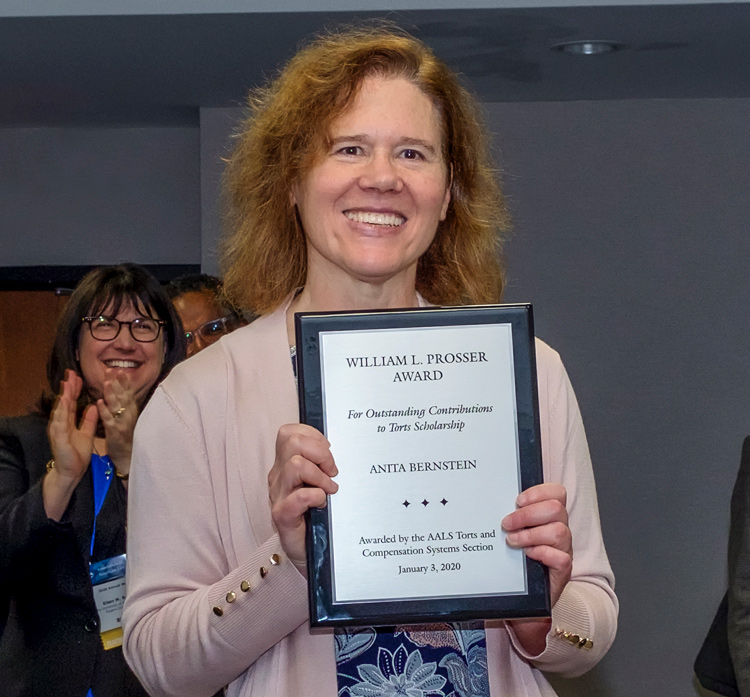
Professor Anita Bernstein received the 2020 William L. Prosser Award at the annual Association of American Law Schools (AALS) Conference. The award, given by the AALS Section on Torts and Compensation Systems, honors the “outstanding contributions of law teachers in scholarship, teaching, and service.”
Bernstein, a nationally recognized authority on tort law, feminist jurisprudence, professional responsibility, and products liability, is a member of the American Law Institute and a past chair of the AALS Executive Committee on Torts and Compensation Systems. She is the second Brooklyn Law faculty member to receive this highly prestigious award, following Professor Aaron Twerski in 2016.

More than 450 Brooklyn Law School alumni, faculty, trustees, and guests gathered at the Mandarin Oriental in New York City on February 7 for the annual Alumni Association Luncheon. Three alumni, all founding partners at their firms, were honored for their outstanding contributions to the Law School community and the legal profession.

“Sometimes the greatest accomplishments are done by people who are doing things for the first time,” said Andrew Zobler ’87 at September’s “Real Estate Roundtable: The Future of Hospitality—Hotel and Restaurant Innovation in NYC, LA, Las Vegas and Beyond.” Zobler, named one of the 50 Most Influential People in global business by Bloomberg Businessweek, kicked off the event with a conversation with Dean Cahill on his experience founding the Sydell Group, which creates and operates unique hotels across the U.S. and London.
Following the chat, Professor Debra Bechtel, director of the Corporate and Real Estate Clinic, led a discussion featuring alumni at the forefront of the hospitality industry: Lon Jacobs ’81, partner at Mintz & Gold and former executive vice president and global general counsel for Las Vegas Sands; Jodi Stein ’06, a partner in the real estate, land use, and environmental practice group at Sheppard Mullin; Robin Zeidel ’97, principal of Zeidel & Associates; and Zobler.
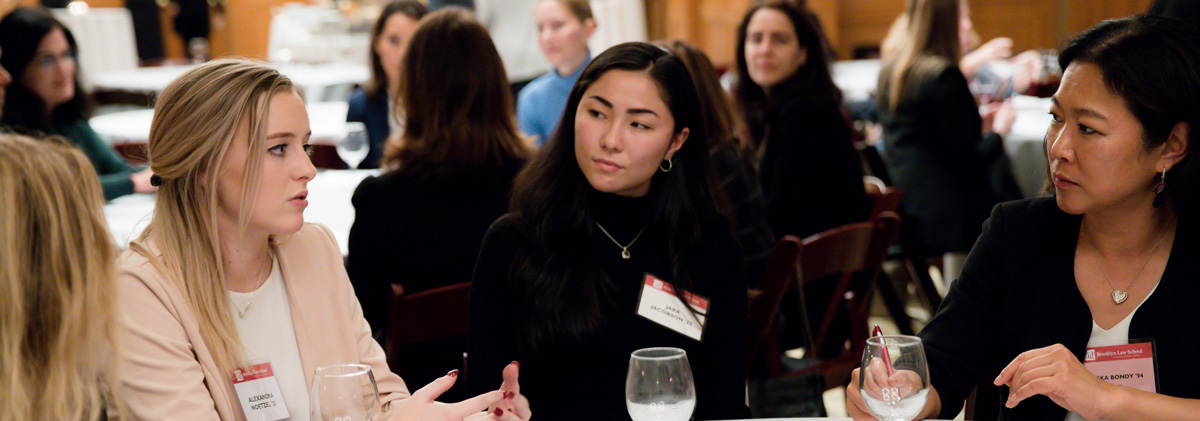

alumni, students, faculty, staff, and friends gathered at the Forchelli Conference Center in November for the Women’s Leadership Network program “Executive Presence: Unlocking Leadership Potential.”
Women’s Leadership Circle Chair Debbie Epstein Henry ’94, an expert and consultant on women, careers, and the law and founder of DEH Consulting, Speaking, Writing, moderated the panel. Panelists Colleen Caden ’99, partner and chair of the immigration group at Pryor Cashman; Kathleen Chastaine ’06, general counsel and chief compliance office of Trillium Management; Eleni Coffinas ’85, member and head of the medical malpractice unit at Sullivan Papain Block McGrath & Cannavo; and Michael Grohman ’83, partner and head of the New York office of Duane Morris, shared their personal experiences and offered their advice.
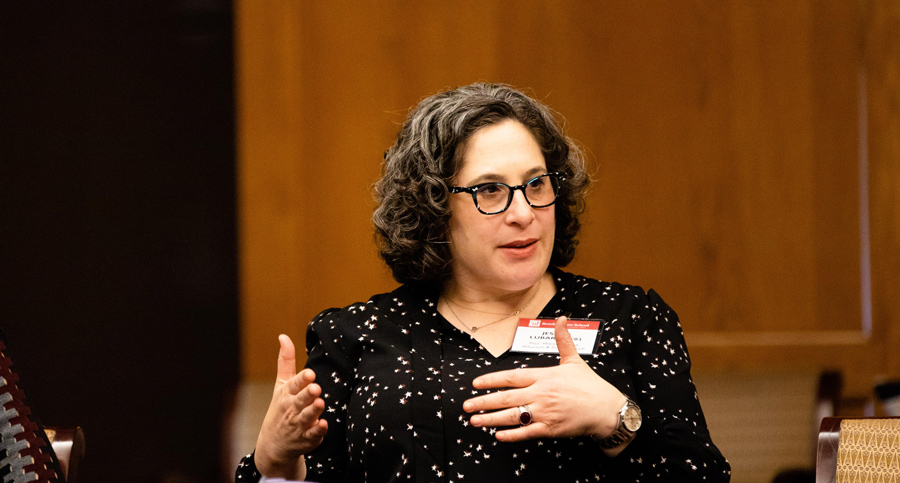
alumni, students, faculty, staff, and friends gathered at the Forchelli Conference Center in November for the Women’s Leadership Network program “Executive Presence: Unlocking Leadership Potential.”
Women’s Leadership Circle Chair Debbie Epstein Henry ’94, an expert and consultant on women, careers, and the law and founder of DEH Consulting, Speaking, Writing, moderated the panel. Panelists Colleen Caden ’99, partner and chair of the immigration group at Pryor Cashman; Kathleen Chastaine ’06, general counsel and chief compliance office of Trillium Management; Eleni Coffinas ’85, member and head of the medical malpractice unit at Sullivan Papain Block McGrath & Cannavo; and Michael Grohman ’83, partner and head of the New York office of Duane Morris, shared their personal experiences and offered their advice.


 To learn more about joining the 1901 Society, please contact Matthew Constantino at matthew.constantino@brooklaw.edu or call 718-780-7505
To learn more about joining the 1901 Society, please contact Matthew Constantino at matthew.constantino@brooklaw.edu or call 718-780-7505
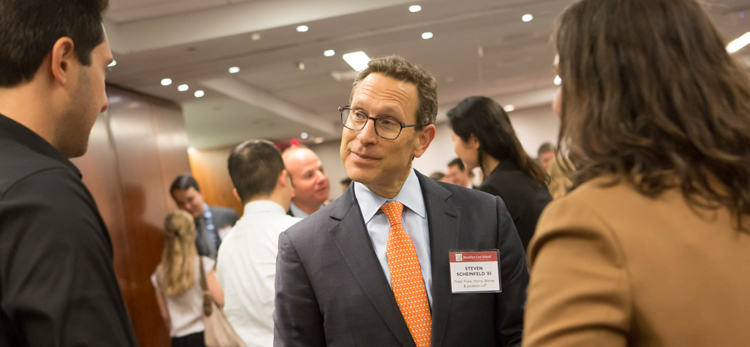
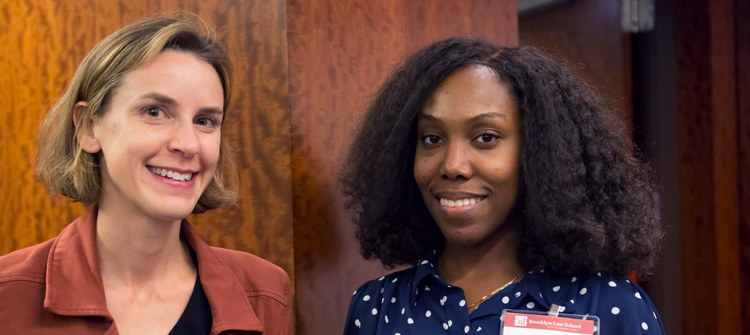
Lawrence A. Sucharow received the Elite Trial Lawyers Lifetime Achievement Award from the National Law Journal for his advocacy style and innovative work in securities class actions. Sucharow is one of the founders, and current chair emeritus, of securities and antitrust class action firm Labaton Sucharow. He is also a member of the Law School’s Board of Trustees.
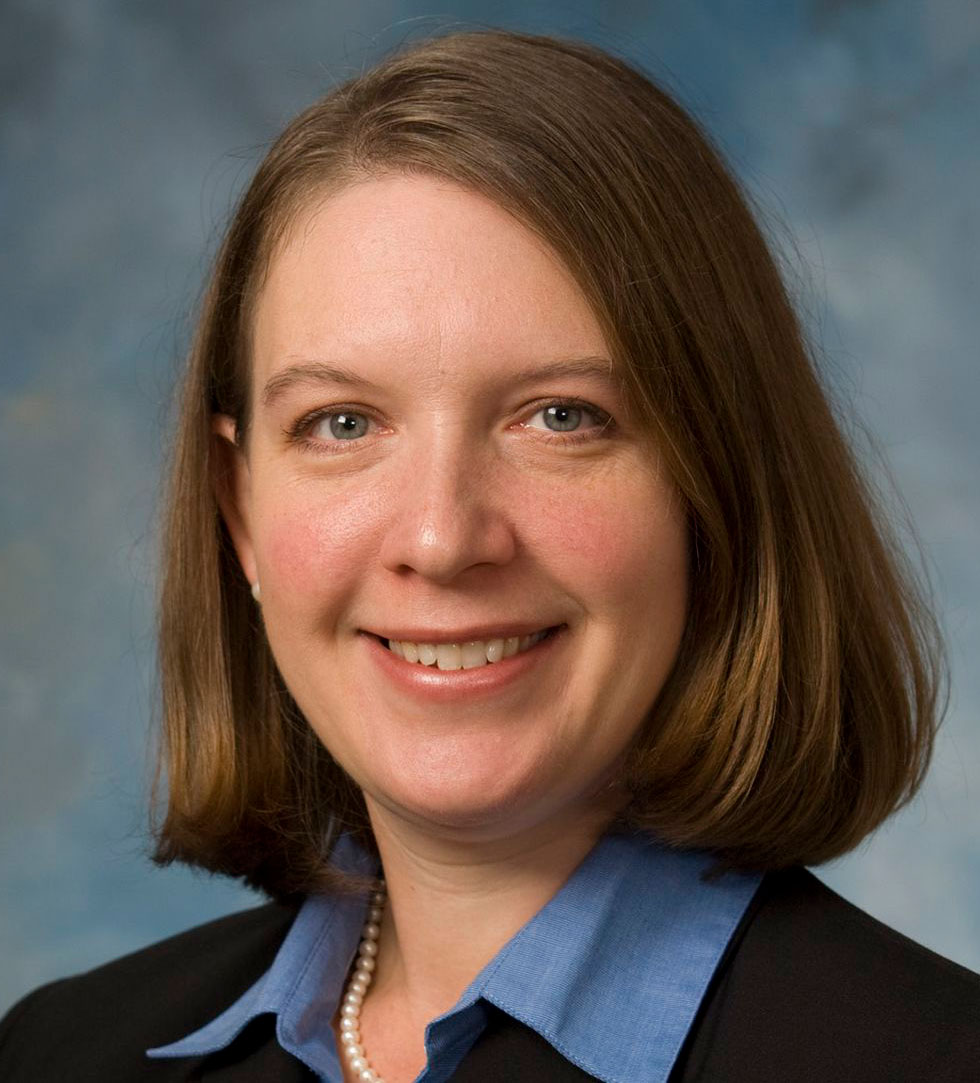 Jennifer Philpott Wilson was confirmed as District Judge of the U.S. District Court for the Middle District of Pennsylvania on November 7, 2019. She was a partner at Philpott Wilson and an adjunct professor at Penn State Dickinson School of Law.
Jennifer Philpott Wilson was confirmed as District Judge of the U.S. District Court for the Middle District of Pennsylvania on November 7, 2019. She was a partner at Philpott Wilson and an adjunct professor at Penn State Dickinson School of Law.Julienne Verdi was selected to the inaugural cohort of the Five Borough Future Fellowship. This program brings together New York civic leaders and helps them launch projects to benefit their community. She is the owner and principal attorney at J. Verdi Law, providing legal services, strategic planning, management, and operations consulting.
From an early age, Anthony M. Miele remembers being interested in writing and mathematics, as well as the law. His mother, a homemaker, and his father, a court stenographer, both encouraged him to pursue his education—and it has become a lifelong passion. Before entering the doctoral program in mathematics education at Teachers College, Columbia University, he had already received his bachelor’s degree in mathematics from Johns Hopkins University, a master’s degree in mathematics from New York University, his law degree from Brooklyn Law School, and a master’s degree in law from the University of London.
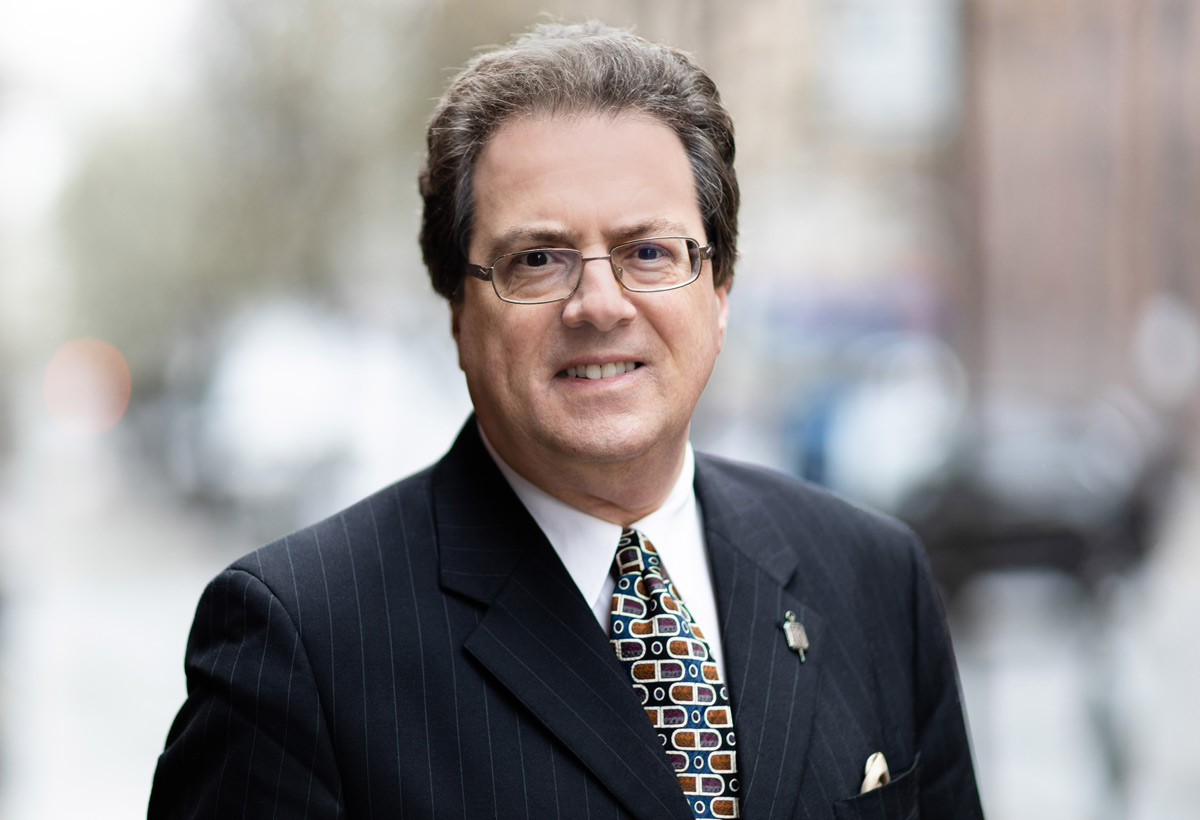
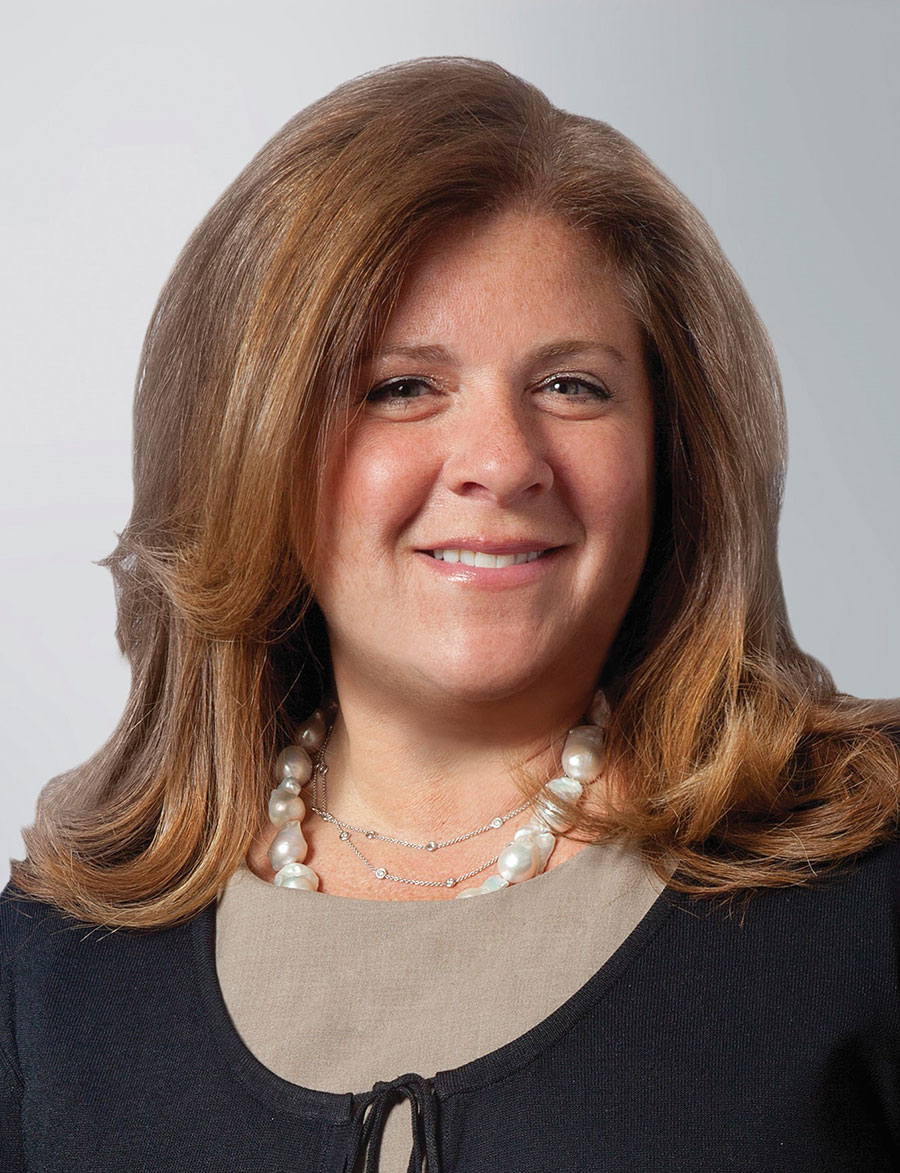
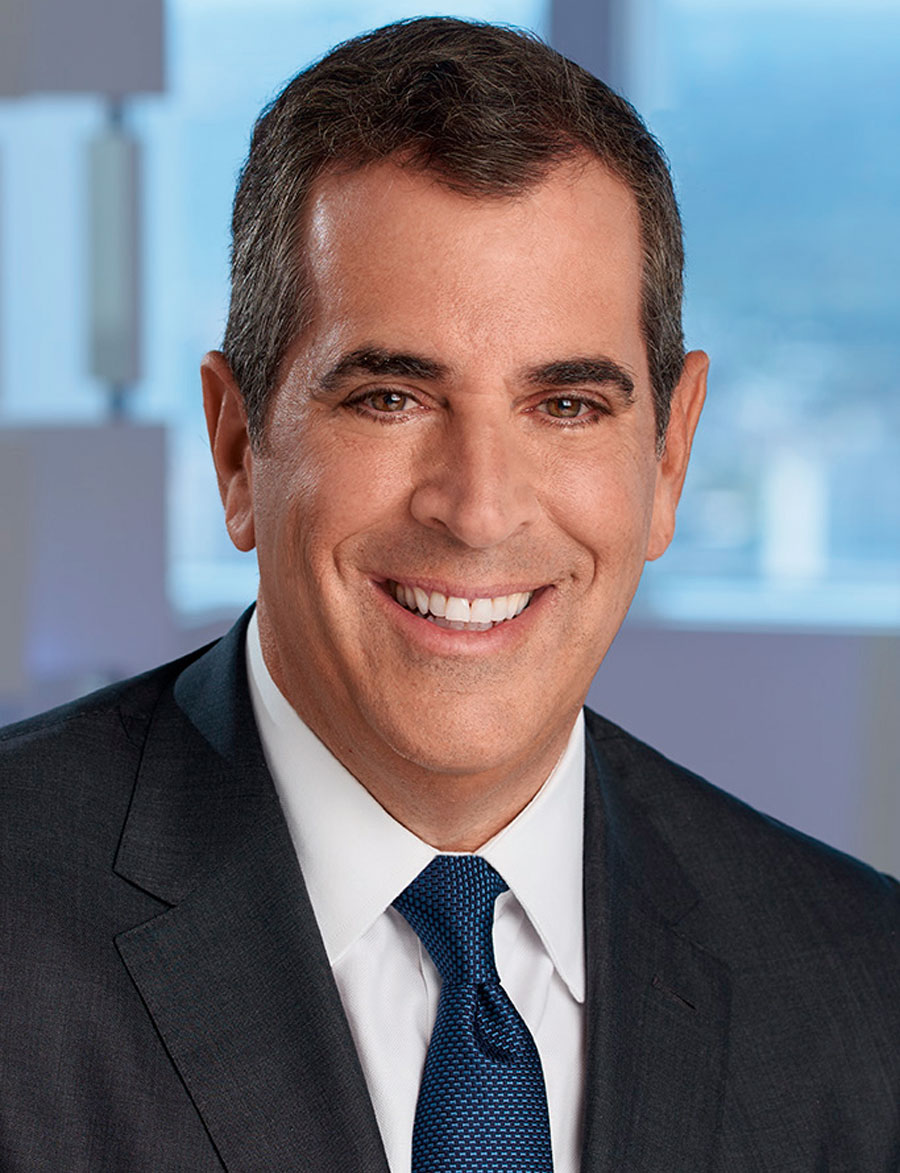

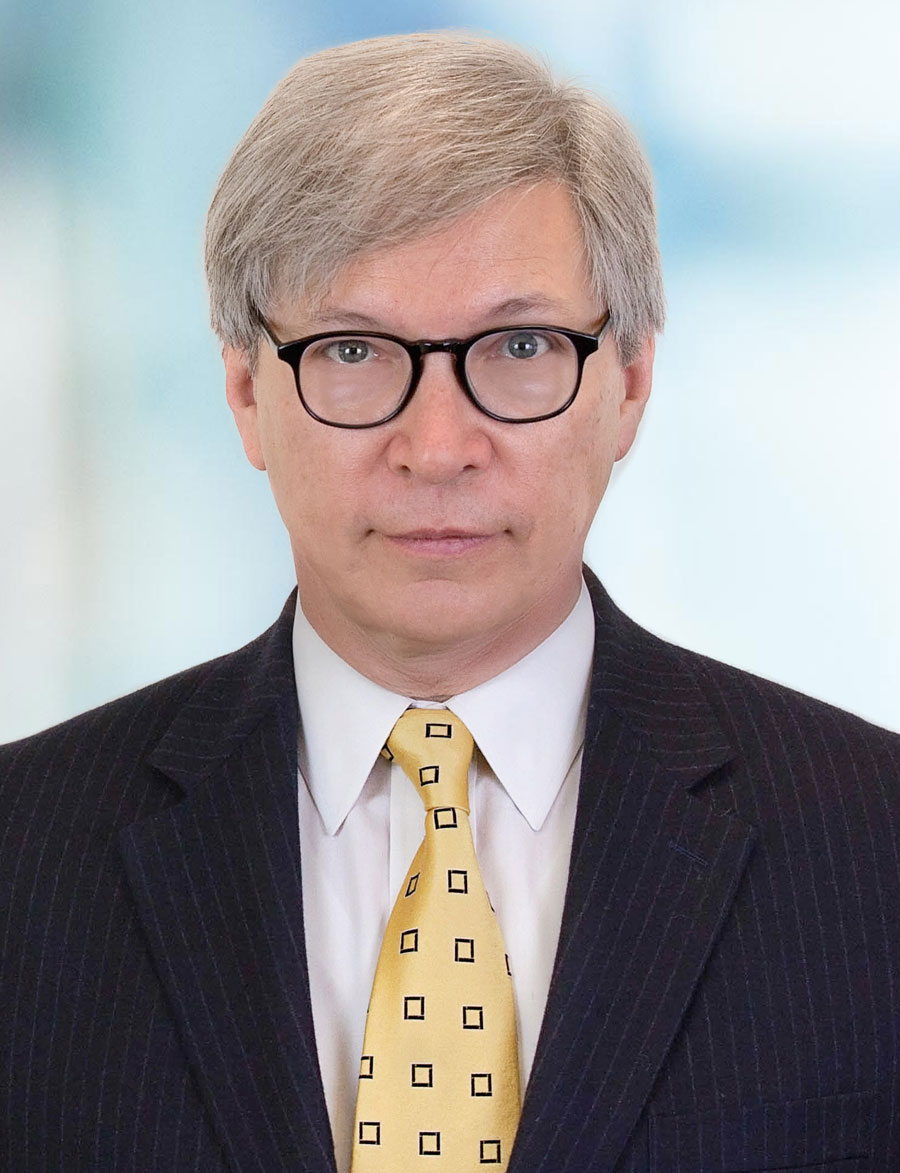
In 2015, after 14 years at the U.S. Attorney’s Office for the Eastern District of New York, Carolyn Pokorny ’94 had just entered the private sector when she learned that her former boss, Loretta E. Lynch, had been nominated as U.S. Attorney General by President Barack Obama.
“I visited her,” said Pokorny, “and said, ‘If you’re taking anyone with you, please keep me in mind.’” Within two weeks, Lynch offered her a spot in her inner circle as deputy chief of staff, assisting with the management of all the agencies under the Department of Justice.
Pokorny is now bringing her dedication and drive to her new role as inspector general of the New York Metropolitan Transportation Authority (MTA), where she is charged with investigating misconduct and rooting out waste, fraud, and abuse in the largest public transit system in the country. It’s the latest stop on a career path where she has held leadership roles across the criminal justice system.
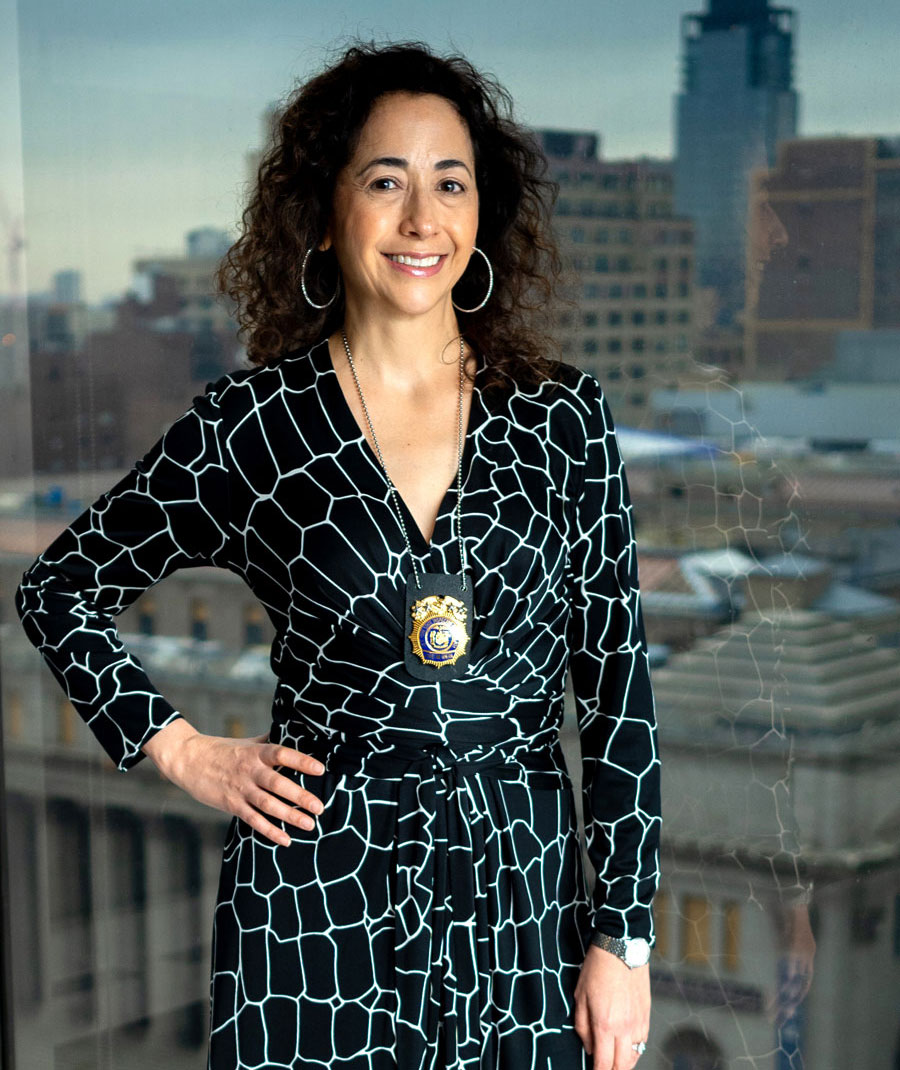
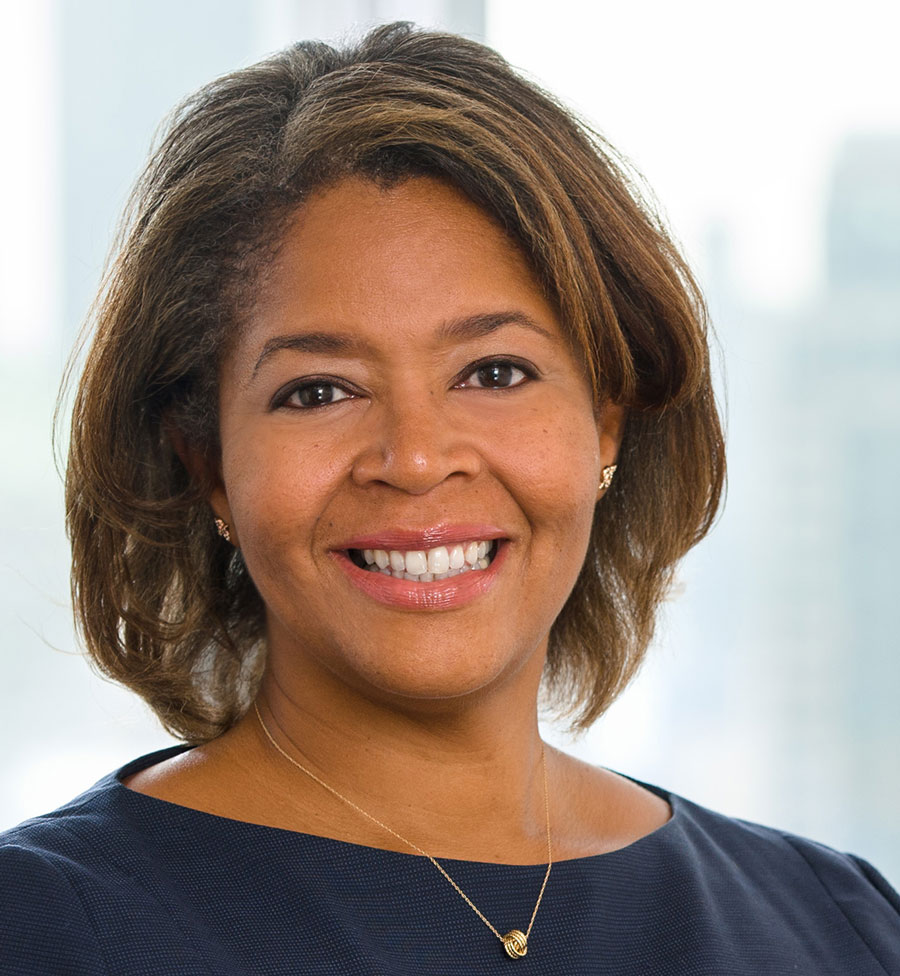
“ENSURING THAT PEOPLE HAVE OPPORTUNITIES to feel empowered and heard is one of the most important things we can do to foster inclusion,” said Melique Jones ’98. “We often speak proudly about our firm’s culture and history, but I think it’s important to explore the possibility that different people, especially people from underrepresented backgrounds, might be experiencing things differently within your organization.”
Jones has been the head of diversity and inclusion at Skadden, Arps, Slate, Meagher & Flom since 2011. She grew up in Harlem and attended St. Aloysius School, which was founded by one of the first orders of all-black nuns in the United States. It was there, she said, around the age of 8 or 9, that she decided to become a lawyer.
Grace Lykins ’13 has a contagious enthusiasm about her work. That energy has powered her on a career path directing public policy and government relations for major multinational companies in the halls of power. As director of global government engagement for Visa in Washington, D.C., Lykins
is responsible for representing the financial services company to government entities, both foreign and domestic.
“I love my job,” said Lykins. “I use my law degree every single day, but in a way that isn’t necessarily what you think about when you’re in law school.”
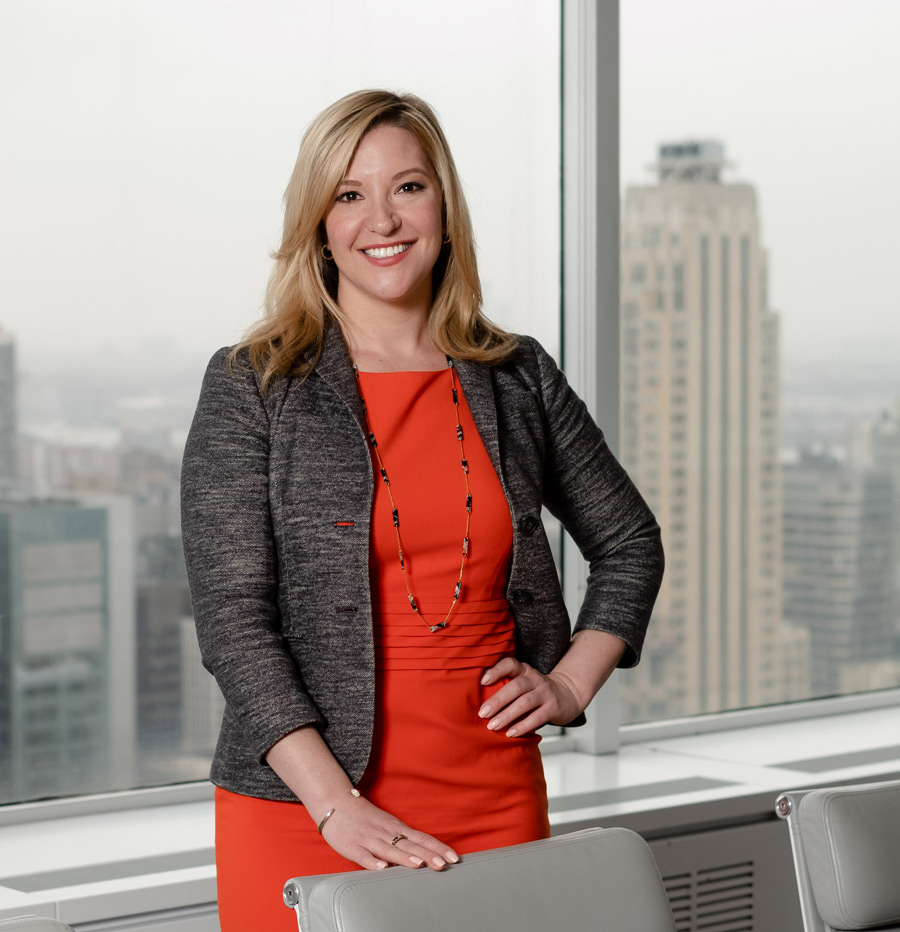
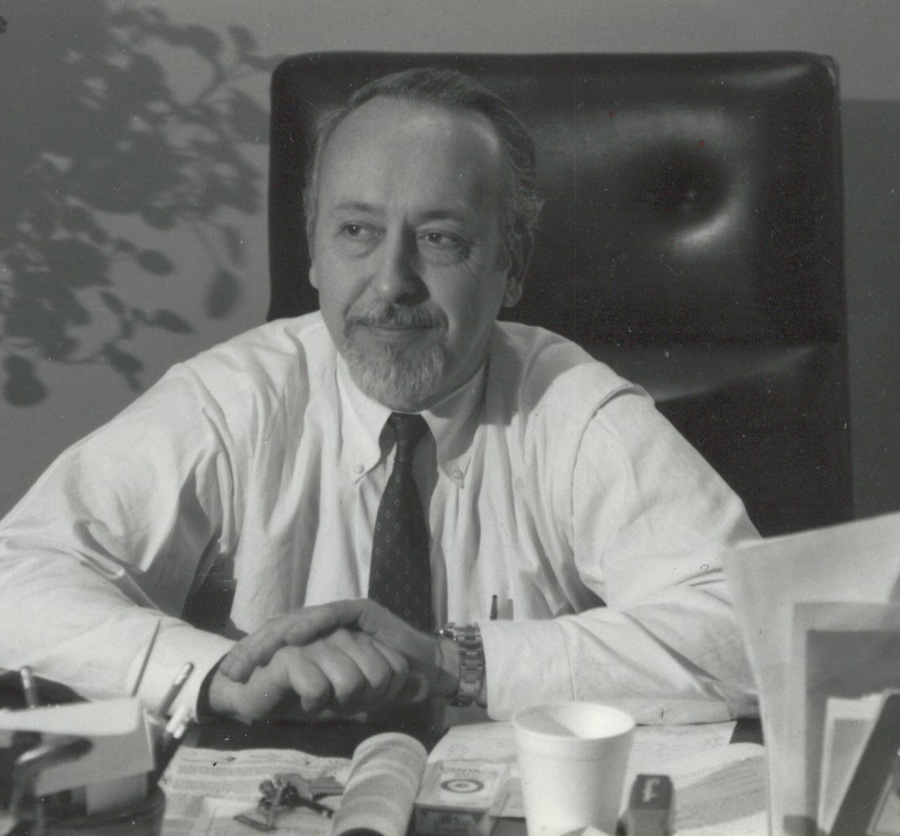
Professor Robert Habl, a longtime faculty member who taught generations of Brooklyn Law School graduates, died Dec. 12, 2019. He was 83.
Habl joined the Brooklyn Law School faculty in 1963. After four decades of teaching, he retired in 2004. At the Law School, he taught classes in contracts, insurance law, and property. He was a graduate of St. John’s University and New York University School of Law, where he received his master’s degree in tax law. He served in the U.S. Army from 1962 to 1967. Before his academic career, he worked as in-house counsel for Pinkerton International and in private practice. He also was a visiting law professor at New York Law School and the University of South Carolina School of Law, and an adjunct professor in the Department of Political Science at the City College of New York.
Habl is remembered by generations of his former students for the lively anecdotes he used to illuminate classroom discussions, always beginning with, “It reminds me of a story…” Other “Habl-isms” former students would quote years later included, “He who trades his horse for a promise deserves to walk,” and “If you don’t know this, you don’t know anything.”
His expertise was highly valued and sought after by numerous government agencies. He served as a consultant to the New York City Transportation Administration and the New York City Board of Education, and as an arbitrator for the New York Civil Court.
Habl is survived by his wife, Margaret Sirot-Habl; his children, Robert, Kris, and Nicole ’99; and his grandchildren, Ava, Hartley, and Lily. He was predeceased by his first wife, Margaret D. Habl.

Closing


Rethinking NDAs Post-#MeToo
The resulting norm of secret settlements not only protected serial harassers and employers who repeatedly violated antidiscrimination laws, but also led the judiciary and the public to believe that employment discrimination and harassment largely had been rectified in the workplace. Employees and other victims had no leverage in the negotiation of these agreements and were powerless to insist that they be a matter of public record. The force of these agreements is demonstrated by the fact that there are almost no reported cases in which employers have sought to enforce them.
